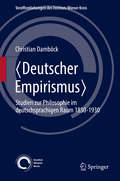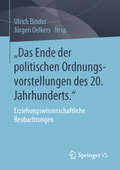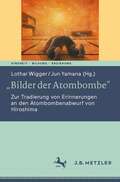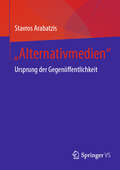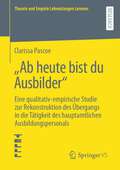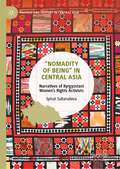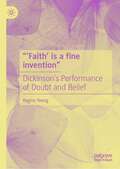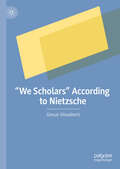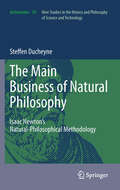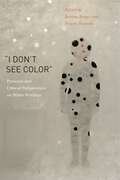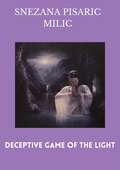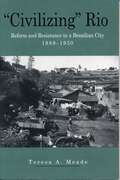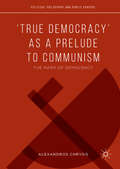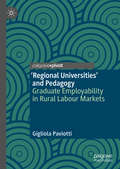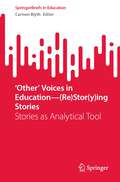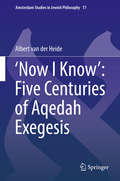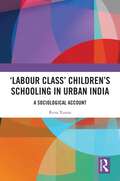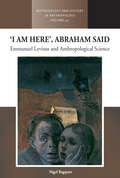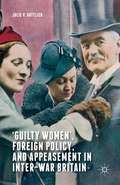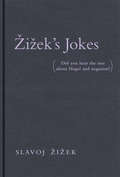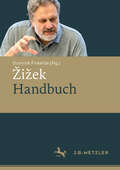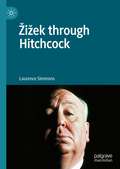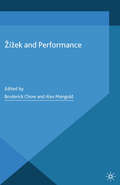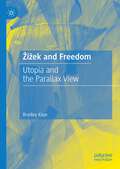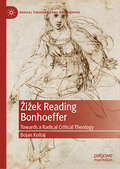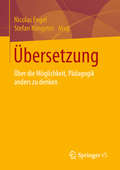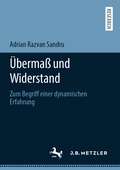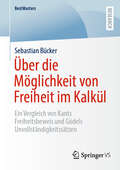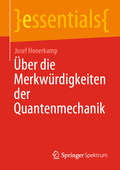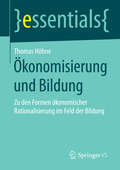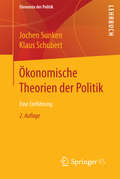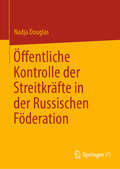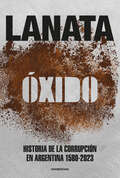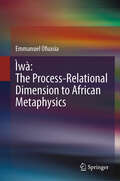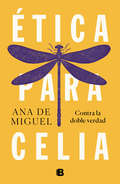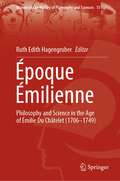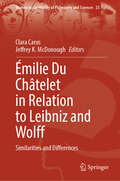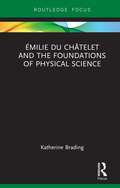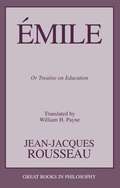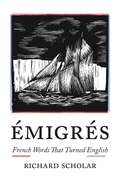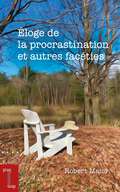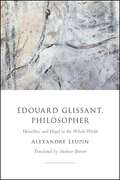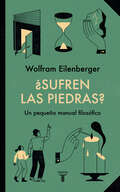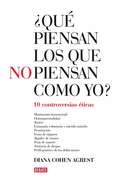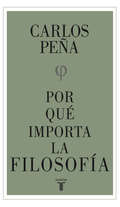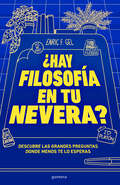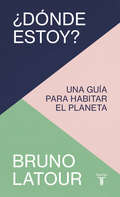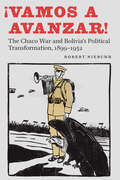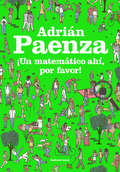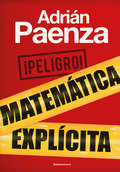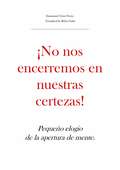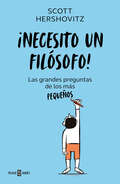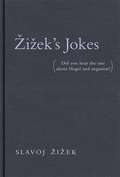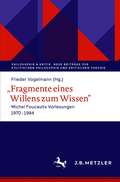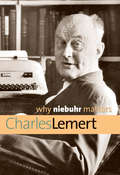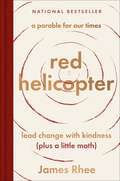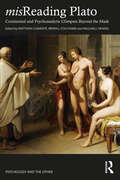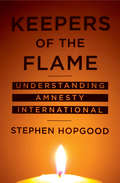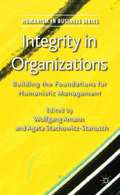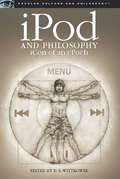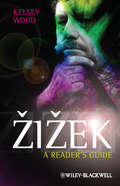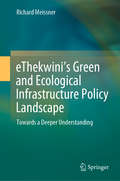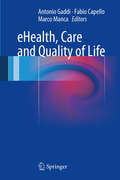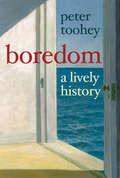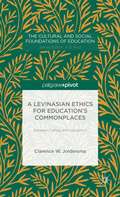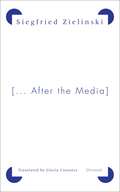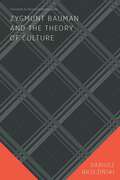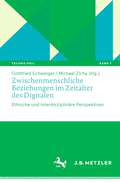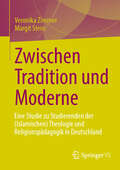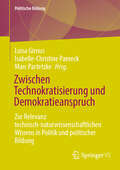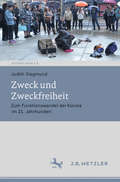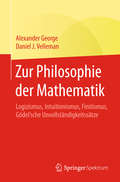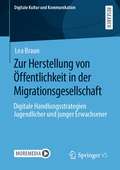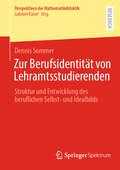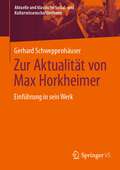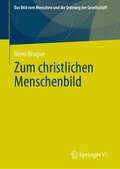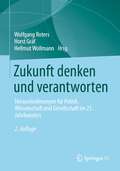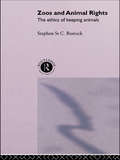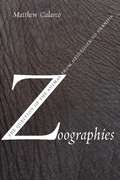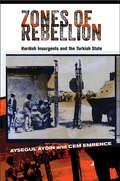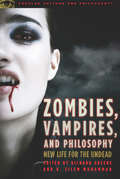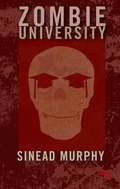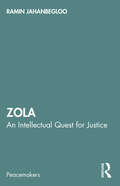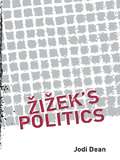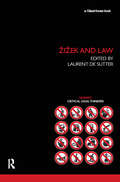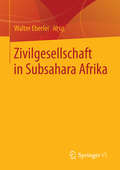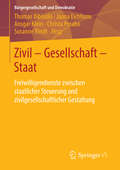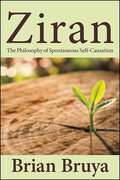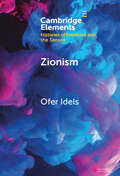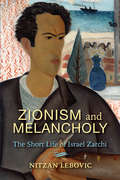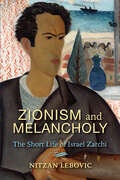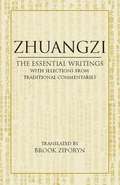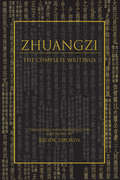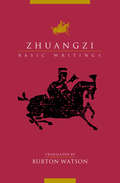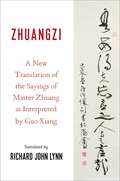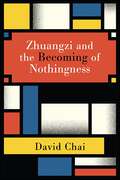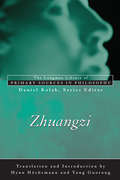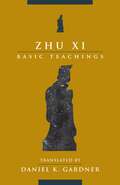- Table View
- List View
〈Deutscher Empirismus〉: Studien zur Philosophie im deutschsprachigen Raum 1830-1930 (Veröffentlichungen des Instituts Wiener Kreis #24)
by Christian DamböckZiel dieser Arbeit ist die Rehabilitierung einer vergessenen Tradition der deutschsprachigen Philosophie des Jahrhunderts von etwa 1830 bis 1930. Das Buch versteht sich als Beitrag zur Geschichte der Philosophie und der Wissenschaftstheorie im deutschsprachigen Raum im neunzehnten und fr#65533;hen zwanzigsten Jahrhundert. Die hier 〈deutscher Empirismus〉 genannte Tradition umfasst als Schl#65533;sselfiguren Wilhelm Dilthey und Hermann Cohen. Das Empirische am 〈deutschen Empirismus〉 liegt nicht in den ,,Sinnesdaten", sondern im abstrakten Bereich von Geist und Kultur. Die wissenschaftlichen Disziplinen auf die sich 〈deutsche Empiristen〉 st#65533;tzen sind prim#65533;r (wenn auch ohne Ausklammerung der f#65533;r die theoretische Philosophie grundlegend wichtigen Naturwissenschaften) die Geisteswissenschaften. Das zeigt sich insbesondere in der von den hier diskutierten Autoren vorangetriebenen geisteswissenschaftlichen Grundlagendisziplin der 〈beschreibenden Psychologie〉. Theoretische Philosophie dient im 〈deutschen Empirismus〉 stets bestimmten praktischen (ethischen, #65533;sthetischen und politischen) Zielsetzungen und erh#65533;lt nur dadurch ihre Rechtfertigung. Rudolf Carnap passt insofern in dieses Bild als auch er, vor allem in seinem Fr#65533;hwerk, von Ideen 〈deutscher Empiristen〉 ausgegangen ist. Carnap erlaubt uns zu sehen, wie diese Ideen in einer Zeit des zwanzigsten Jahrhunderts erhalten geblieben sind, in der die Philosophie ansonsten eher ,,auf den eisigen Firnen der Logik ein zur#65533;ckgezogenes Dasein" zu f#65533;hren begann. Lydia Patton: ,,Deutscher Empirismus demonstrates a profound knowledge of nineteenth and early twentieth century philosophy and science. The work promises to inform and to inspire research in the field, and I have little doubt that it will do so. " Massimo Ferrari: ,,Deutscher Empirismus bildet einen wertvollen Beitrag zur Erforschung der deutschen Philosophie. Es handelt sich um eine sehr eingehende Analyse, die auf ausf#65533;hrlichen Quellenuntersuchungen beruht und zugleich innovative systematische Ans#65533;tze konturiert. " Uljana Feest: ,,Deutscher Empirismus legt eine eigenwillige neue Achse durch die Philosophiegeschichte des deutschsprachigen 19. Jahrhunderts. Entgegen der herrschenden Meinung, dass die deutschsprachige akademische Philosophie in den mittleren 40 Jahren des 19. Jahrhunderts weitgehend zum Erliegen kam und sich erst ab ca. 1870 wieder zu erholen begann, argumentiert Damb#65533;ck, dass ab ca. 1830 im Gegenteil eine vielversprechende, ja ,fortschrittliche' (wenn auch heute weitgehend vergessene), philosophische Tradition entstand. Die Arbeit zeichnet sich durch ein feines Gesp#65533;r f#65533;r die historiographischen Fallstricke des vorgelegten Argumentes aus. Man hat von Anfang an das Gef#65533;hl, es hier mit einem Autoren zu tun zu haben, der den ungeheuren Material- und Detailreichtum der von ihm gew#65533;hlten philosophiehistorischen Epoche souver#65533;n beherrscht. "
„Das Ende der politischen Ordnungsvorstellungen des 20. Jahrhunderts.": Erziehungswissenschaftliche Beobachtungen
by Jürgen Oelkers Ulrich BinderDer Band fasst erziehungswissenschaftliche Erkenntnisse und Positionierungen zur aktuellen historischen Phase, die mit guten Gründen als der endgültige Bruch mit soziopolitischen, -kulturellen und -moralischen Ordnungsvorstellungen des 20. Jahrhunderts bezeichnet wird, zusammen.
„Bilder der Atombombe“: Zur Tradierung von Erinnerungen an den Atombombenabwurf von Hiroshima (Kindheit – Bildung – Erziehung. Philosophische Perspektiven)
by Lothar Wigger Jun YamanaDas Buch beschreibt und analysiert ein Bildungsprojekt des Friedensgedächtnismuseums Hiroshima und der städtischen Motomachi Senior High-School, das einen neuartigen Weg einschlägt und bis heute einmalig ist. In dem Projekt „Pictures of the Atomic Bomb: Drawing with the Next Generation“ setzen Schüler:innen die Erzählungen von Opfern des Atombombenabwurfs in Gemälde um. Der Band präsentiert zum ersten Mal das Projekt außerhalb Japans und interpretiert und diskutiert es in einem internationalen wissenschaftlichen Kontext. Das Buch enthält neben zahlreichen Abbildungen Erfahrungsberichte von Schüler:innen, die an dem Schulprojekt teilgenommen haben, sowie wissenschaftliche Interpretationen und Analysen japanischer und deutschsprachiger Wissenschaftler:innen aus pädagogischer, psychologischer, kunsttheoretischer, medienwissenschaftlicher, sozialwissenschaftlicher und philosophischer Perspektive. Zur Zielgruppe gehören neben diesen Wissenschaften auch Schulen, Museen und die interessierte Öffentlichkeit.
„Alternativmedien“: Ursprung der Gegenöffentlichkeit
by Stavros ArabatzisDieses Buch geht der Frage nach, inwiefern die neuen Medien der Gegenöffentlichkeit eine wirkliche ‚Alternative‛ darstellen. Dabei versucht es die moderne Funktion der Gegenöffentlichkeit auch von ihrem Ursprung her zu denken, wie sie etwa in der Figur eines Sokrates oder im Höhlengleichnis Platons als „Gewaltsamkeit‟ von Unter- und Oberwelt vorformuliert wurde. Der Rekurs auf den ‚Ursprung‛ der Mainstream- und Alternativmedien ist kein historizistisches, akademisches, altphilologisches Unternehmen, das von Griechenland aus hereingaloppierend in unserer Zeit endet. Vielmehr beschreibt er die Fassade der Mainstreammedien, hinter der eine Entwicklung im Gegensinn, zum archaischen Grund hin verläuft und auf den heute die Alternativmedien in ihrer Kritik eine Antwort suchen. Die Kehrseite dieses Prozesses der Öffentlichkeit ist nämlich die heimliche Durchsetzung der alten, archaischen Imperative (heute befehlen sie: ‚Sei demokratisch!‛ oder ‚Sei autokratisch!‛) innerhalb von Aufklärung, Modernität, Emanzipation und Befreiung. Das Buch versucht sowohl den Mainstreammedien als auch den Alternativmedien in ihrer Kritik gerecht zu werden.
„Ab heute bist du Ausbilder“: Eine qualitativ-empirische Studie zur Rekonstruktion des Übergangs in die Tätigkeit des hauptamtlichen Ausbildungspersonals (Theorie und Empirie Lebenslangen Lernens)
by Clarissa PascoeIn diesem Buch wird der Übergang aus einer Tätigkeit als gewerblich-technische Fachkraft in die hauptamtliche Ausbildungsfunktion in einer betrieblichen Ausbildungswerkstatt untersucht. In einem fallrekonstruktiven Forschungsansatz wird das Erleben und Bewältigen von typischen Herausforderungen während und infolge dieses Übergangs nachgezeichnet. Hierzu wurden hauptamtliche Ausbilder*innen in den industriellen Metall- und Elektroberufen zu ihren Übergangserfahrungen befragt. Ergebnis ist eine empirisch fundierte Beschreibung von fünf typischen Entwicklungsaufgaben, mit denen Ausbilder*innen während und infolge des Übergangs konfrontiert werden und die sie in Abhängigkeit von subjektiven Ressourcen und Orientierungen unterschiedlich deuten und bearbeiten. Die Fallrekonstruktion führt zu vier Typen von Bewältigungsstrategien, die sich hinsichtlich ihres Umgangs mit Erfahrungswissen, ihrer pädagogischen Überzeugungen sowie ihres Reflexionswissens unterscheiden. Darauf aufbauend wird mit Hilfe des Sozialweltkonzeptes die Frage nach der Rolle und Funktion einer übergeordneten kollegialen Bezugsgemeinschaft als potentielle Wissens- und Kompetenzgrundlage der Akteure der beruflich-betrieblichen Bildung vor dem Hintergrund der strukturellen Rahmenbedingungen und Systemspezifika diskutiert.
”Nomadity of Being” in Central Asia: Narratives of Kyrgyzstani Women’s Rights Activists (Politics and History in Central Asia)
by Syinat SultanalievaThis book offers a new framework for understanding feminism and political activiism in Kyrgyzstan, “nomadity of being. ” Here, foreign information and requirements, even forced ones, are transformed into an amalgamation of the new and the old, alien and native—like kurak, a quilted patchwork blanket, made from scraps. Conceptualizing feminist narratives in Kyrgyzstan, while keeping in mind, the complex relationship between ideological borrowing, actualization, appropriation or self-colonization of “feminist” concepts can expand both scholarly and activist understanding of specificities of post-Soviet feminisms from a historiographic point of view. Kurak-feminism is feminism that is half-donor-commissioned, half-learned through interactions (personal, media, academic, professional), unashamed of its borrowed nature and working toward its own purpose that is being developed as the blanket is being quilted. Weaving in elements from completely different and, to a Western eye, incompatible approaches nomadity of being might pave the way toward a Central Asian reframing of non-Western feminisms. This provocative text will interest scholars of European politics, the post-Soviet sphere, and feminists.
“‘Faith’ is a fine invention”: Dickinson’s Performance of Doubt and Belief
by Regina YoongThis book covers nineteenth-century American poet Emily Dickinson who captured the multifaceted nature of life in all of its uncertainties. Studies on her exploration of faith are ample, but in this book, the author uncovers Dickinson’s playful role-play in enacting solemn themes of religion, death, and the unknown. Dickinson’s creativity encompasses not only her use of language but also her poetic personae and self-created poetic stages inviting readers to question, contemplate deeply or even poke fun at life's absurdities. By using performative roles such as the rejected outcast, passive supplicant, and playful warrior, Dickinson unveils--through a paradoxical framework of belief and unbelief-- a line of inquiry that is multifocal and erratic to “tell all the truth and tell it slant.”
“We Scholars” According to Nietzsche
by Giosuè GhisalbertiThis book examines Nietzsche’s early writings on education, paying particular attention to his thought on scholarship and teaching. Giosuè Ghisalberti examines Nietzsche’s view of himself as a teacher in the broader context of his reflections on scholarship and philology, and puts Nietzsche’s examination into conversation with prominent themes in his later philosophy (including morality, truth, and language). The book is to be read as an assessment of our social predicament, in and out of the university. “We Scholars” According to Nietzsche develops ideas on our contemporary world most especially in institutions of higher learning and how morality is proving to be inimical to freedom.
“The main Business of natural Philosophy”: Isaac Newton’s Natural-Philosophical Methodology (Archimedes #29)
by Steffen DucheyneIn this monograph, Steffen Ducheyne provides a historically detailed and systematically rich explication of Newton's methodology. Throughout the pages of this book, it will be shown that Newton developed a complex natural-philosophical methodology which encompasses procedures to minimize inductive risk during the process of theory formation and which, thereby, surpasses a standard hypothetico-deductive methodological setting. Accordingly, it will be highlighted that the so-called 'Newtonian Revolution' was not restricted to the empirical and theoretical dimensions of science, but applied equally to the methodological dimension of science. Furthermore, it will be documented that Newton's methodology was far from static and that it developed alongside with his scientific work. Attention will be paid not only to the successes of Newton's innovative methodology, but equally to its tensions and limitations. Based on a thorough study of Newton's extant manuscripts, this monograph will address and contextualize, inter alia, Newton's causal realism, his views on action at a distance and space and time, the status of efficient causation in the /Principia/, the different phases of his methodology, his treatment of force and the constituents of the physico-mathematical models in the context of Book I of the /Principia/, the analytic part of the argument for universal gravitation, the meaning and significance of his regulae philosophandi, the methodological differences between his mechanical and optical work, and, finally, the interplay between Newton's theology and his natural philosophy.
“I Don’t See Color”: Personal and Critical Perspectives on White Privilege
by Bettina Bergo Eula Biss Tracey NichollsWho is white, and why should we care? There was a time when the immigrants of New York City’s Lower East Side—the Irish, the Poles, the Italians, the Russian Jews—were not white, but now “they” are. There was a time when the French-speaking working classes of Quebec were told to “speak white,” that is, to speak English. Whiteness is an allegorical category before it is demographic.This volume gathers together some of the most influential scholars of privilege and marginalization in philosophy, sociology, economics, psychology, literature, and history to examine the idea of whiteness. Drawing from their diverse racial backgrounds and national origins, these scholars weave their theoretical insights into essays critically informed by personal narrative. This approach, known as “braided narrative,” animates the work of award-winning author Eula Biss. Moved by Biss’s fresh and incisive analysis, the editors have assembled some of the most creative voices in this dialogue, coming together across the disciplines. Along with the editors, the contributors are Eduardo Bonilla-Silva, Nyla R. Branscombe, Drucilla Cornell, Lewis R. Gordon, Paget Henry, Ernest-Marie Mbonda, Peggy McIntosh, Mark McMorris, Marilyn Nissim-Sabat, Victor Ray, Lilia Moritz Schwarcz, Louise Seamster, Tracie L. Stewart, George Yancy, and Heidi A. Zetzer.
“Deceptive game of the light.”: SERBIAN (1 #1000)
by Snezana Pisaric MilicBook description: An exciting story about two women they talk about their fates. Six love stories in a novel. One woman is young, the other old. Events in the Balkans - Bosnia and Herzegovina, Croatia and Serbia. The love of Christians and Muslims. The war is over. Translation from Google Translate
“Civilizing” Rio: Reform and Resistance in a Brazilian City, 1889–1930
by Teresa MeadeA massive urban renewal and public-health campaign in the first decades of the nineteenth century transformed Brazil's capital into a showcase of European architecture and public works. The renovation of Rio, or "civilization" campaign, as the government called it, widened streets, modernized the port, and improved sanitation, lighting, and public transportation. These changes made life worse, not better, for the majority of the city's residents, however; the laboring poor could no longer afford to live in the downtown, and the public-health plan did not extend to the peripheral areas where they were being forced to move. Their resistance is the focus of Teresa Meade's study.Meade details how Rio grew according to the requirements of international capital, which financed, planned, and oversaw the renewal—and how local movements resisted these powerful, distant forces. She also traces the popular rebellion that continued for more than twenty years after the renovation ended in 1909, illustrating that community protests are the major characteristic of political life in the modern era.
‘True Democracy’ as a Prelude to Communism
by Alexandros ChrysisThis book constitutes a critical intervention in the theoretical discussion over the political relationship between democracy and communism. Shedding light on the philosophical origins of the democracy debate, it draws a clear demarcation line between liberalism and republicanism, arguing that after rejecting the former and supporting the latter, the young Marx endorsed 'true democracy' as a prelude to his forthcoming theory of communism. To this end, while following the dynamics of the Marxian history of political ideas and pre-communist theory of the state, the book takes into account the thought of a vast range of philosophers and political theorists, starting from the Ancient times (Aristotle), passing through the Age of Enlightenment (Spinoza, Rousseau), the German Idealist tradition (Hegel) the Young Hegelians’ Republicanism (Bauer, Ruge, Feuerbach), and reaching our own times (Arendt, Colletti, MacPherson, Castoriadis, Poulantzas). It will be of interest to students and scholars interested in the history of political thought, theories of democracy, and Marxism.
‘Regional Universities’ and Pedagogy: Graduate Employability in Rural Labour Markets
by Gigliola PaviottiThis book explores the issue of graduate employability in rural labour markets. European higher education institutions are expected to be crucial players in terms of regional innovation, contributing through research, education and formation of human capital. The author asks how this role be played out equally in urban and rural areas. In rural areas, the most educated young members of society often find it impossible to contribute to the local economy and feel forced to seek better prospects in urban centres. The author examines the roles of higher education in rural centres, as well as the transitions from education to work by taking the point of view of students and graduates. Finally, the book offers advice for pedagogies that support the increase of employability potential for rural economies.
‘Other’ Voices in Education—: Stories as Analytical Tool (SpringerBriefs in Education)
by Carmen BlythThis book explores how stories can be used as ‘data’ that prefigure and make possible the numerous permutations of life that comprise existence, and examines how stories can be reconfigured to transform that existence into something 'other'. It uses varied theoretical and critical frameworks such as autoethnography and posthumanism with which to explore the stories shared that go ‘beyond cause and effect’. This book looks to engage with storying and storytelling as inquiry in non-Western ‘worlds’, and looks to make ‘storying’, ‘restor(y)ing’, and ‘stories’ written by non-Western educators the locus of attention. By doing so, it seeks to illustrate what distinctive ways of storying and storytelling can look like in worlds other than those that follow a Western ethico-onto-epistemological worldview. It provides a way to articulate thought that may be commonly omitted in teacher education around the world, and looks at ‘truth’ as situated rather than as totality, local rather than global, with stories used to problematize subject/object positionings within those same stories.
‘Now I Know’: Five Centuries of Aqedah Exegesis
by Albert van der HeideThis book describes how medieval Jewish Bible scholars sought to answer the question of what is meant by the Angel’s message from God to Abraham: ‘Now I Know’, as written in Genesis 22 verse 12. It examines these scholars’ comments on the nineteen verses in Genesis that tell the story of Abraham’s readiness to sacrifice his own son Isaac, the Aqedat Yiṣḥaq. It explores the answers they found to the question of what, indeed, this story is trying to tell us. Is it a drastic way to condemn the practice of child sacrifice? Does it call for replacing human sacrifices with animal sacrifices? Is it a trial by which the Almighty tests the fidelity of one of His followers? Or is it His way to show the world the nature of true belief?The book starts with an introduction to familiarize readers with the many and varied manifestations of the Aqedah theme in Jewish culture and with the developments of medieval Jewish Bible exegesis in general. Next, it offers translations and analyses of the classical medieval Jewish Bible commentaries that deal with the exegesis of Genesis 22, exploring the many angles from which the Aqedah story has been understood. No less than five centuries of medieval Aqedah exegesis are reviewed, from Saadya (882-942) to Isaac Abrabanel (1437-1508). These texts from the commentaries are combined with hermeneutical key passages by Moses Maimonides, Joseph Ibn Kaspi, Ḥasdai Crescas, and others, which were familiar to the minds of the exegetes, or which, conversely, reflect the impact of biblical Aqedah exegesis on religious thought. Together, the passages discussed illustrate the growth and development of Jewish Bible exegesis in dialogue with the rabbinic sources and with the various trends of thought and theology of their times. The consistent focus on the Aqedah constitutes a unifying theme, while the insights presented here greatly advance our understanding of the various developments in medieval Jewish Bible exegesis.
‘Labour Class’ Children’s Schooling in Urban India: A Sociological Account
by Reva YunusDrawing upon classroom ethnography and interviews with parents and pupils in urban central India, this book offers systematic sociological analyses of childhood, labour and schooling in postcolonial, post-liberalisation India. It combines insights from economic sociology, political economy and feminist critiques of capitalism, caste patriarchy and globalisation to theorise the relationship between educational experience and socioeconomic inequalities. A vital intervention in dominant development discourses centring on the relationship between poverty and poor children’s schooling in the global South it unpacks poverty as a structural condition shaped by class and caste relations. Unravelling the interplay of poverty, caste patriarchy and shifts in the gendered division of reproductive labour it challenges both the ‘girl effect’ narrative as well as the ‘school/labour’ binary. It offers insights into ‘labour class’ families’ experience of urban informal work enabling a critical account of the gendered place of school in children’s lives and render visible poor parents’ and pupils’ efforts to ensure educational success. Thick descriptions of pedagogic and disciplinary processes and social relations in the classroom allow it to grapple with teachers’ ‘deficit view’ of the labour class as well as the impact of stratified schooling on teachers’ working conditions and teacher-pupil relations. The book presents a rare account of teenaged children’s gendered modes of negotiation of social relations at school and home, waged and unwaged work, economic and educational deprivation and pedagogic practices in the classroom. It will appeal to scholars interested in the sociology of education and childhood, gender and caste inequalities, international development, poverty and urban informal work.
‘I am Here’, Abraham Said: Emmanuel Levinas and Anthropological Science (Methodology & History in Anthropology #47)
by Nigel RapportEmmanuel Levinas’s philosophical work on ‘the Other’ offers a challenge to the discipline of anthropology that claims knowledge of the human. For Levinas, the ‘secrecy’ of subjectivity – a fundamental facet of the human condition – demands an ethics of ignorance and not-knowing; the mystery of otherness is only to be approached through ‘inspiration’. Can anthropology meet a Levinasian challenge if it would define itself as a science as well as a humanistic documentation of social life? This book endeavours to take Levinasian and anthropological precepts equally seriously and offers a radical conclusion.
‘Guilty Women’, Foreign Policy, and Appeasement in Inter-War Britain: Foreign Policy, And Appeasement In Inter-war Britain
by Julie V. GottliebBritish women were deeply invested in foreign policy between the wars. This study casts new light on the turn to international affairs in feminist politics, the gendered representation and experience of the Munich Crisis, and the profound impression made by female public opinion on PM Neville Chamberlain in his negotiations with the dictators.
Žižek’s Jokes: (Did you hear the one about Hegel and negation?)
by Slavoj ŽižekThe good news is that this book offers an entertaining but enlightening compilation of Žižekisms. Unlike any other book by Slavoj Žižek, this compact arrangement of jokes culled from his writings provides an index to certain philosophical, political, and sexual themes that preoccupy him. Žižek's Jokes contains the set-ups and punch lines—as well as the offenses and insults—that Žižek is famous for, all in less than 200 pages. So what's the bad news? There is no bad news. There's just the inimitable Slavoj Žižek, disguised as an impossibly erudite, politically incorrect uncle, beginning a sentence, “There is an old Jewish joke, loved by Derrida...“ For Žižek, jokes are amusing stories that offer a shortcut to philosophical insight. He illustrates the logic of the Hegelian triad, for example, with three variations of the “Not tonight, dear, I have a headache” classic: first the wife claims a migraine; then the husband does; then the wife exclaims, “Darling, I have a terrible migraine, so let's have some sex to refresh me!” A punch line about a beer bottle provides a Lacanian lesson about one signifier. And a “truly obscene” version of the famous “aristocrats” joke has the family offering a short course in Hegelian thought rather than a display of unspeakables. Žižek's Jokes contains every joke cited, paraphrased, or narrated in Žižek's work in English (including some in unpublished manuscripts), including different versions of the same joke that make different points in different contexts. The larger point being that comedy is central to Žižek's seriousness.
Žižek-Handbuch
by Dominik FinkeldeSlavoj Žižek ist der international einflussreichste Philosoph und Vertreter einer Kritischen Theorie der Gegenwart. Er hat mit seinen mehr als 50 Büchern die Grenzen der Kulturtheorie, der Philosophie, der Psychoanalyse und der Subjektphilosophie des Deutschen Idealismus erweitert und Debatten von der politischen Philosophie bis zur Ontologie geprägt. Mit unübertroffener Kreativität und schillerndem Witz präsentiert er innovative und herausfordernde Analysen. Sie betreffen die politischen Verhältnisse der Gegenwart ebenso wie klassischen Fragen von Wahrheit und Schein, Freiheit und Unterwerfung. Konzepte wie Genießen als politischer Faktor, gespaltene Subjektivität, Objekt klein a, Anrufung und Parallaxe haben das Vokabular der kontinentalen Philosophie der Gegenwart wesentlich bereichert. Das Handbuch versammelt national und international anerkannte Philosophinnen und Philosophen, die sich seit den 1990er Jahren immer wieder mit Žižeks Philosophie auseinandergesetzt haben. Nach einem (werk-)biographischen Überblick führen sie in seine Werke ein, ebenso wie in die Wirkungsweisen derselben auf die zeitgenössische Theorie. Auch Kritik und Kontroversen, die Žižeks Publikationen und Positionen ausgelöst haben, werden rezipiert und dargelegt.
Žižek through Hitchcock
by Laurence SimmonsMaverick Slovenian cultural theorist, philosopher and psychoanalyst Slavoj Žižek has made his name elaborating the complexities of psychoanalytic and Marxist theory through the exotic use of examples from film and popular culture. But what if we were to take Žižek’s pretensions to cinephilia and film criticism seriously? In this book, adopting Žižek’s own tactic of counterintuitive observation, we shall read the corpus of Alfred Hitchcock’s films (‘one of the great achievements of Western civilization’) and Žižek’s idiosyncratic citation of them in order to arrive at a position where we can identify the core commitments that inform Žižek’s own work. From the practice of Hitchcock we shall (hopefully) arrive at a theory of Žižek (just as Žižek in his collection Everything You Always Wanted to Know About Lacan (But Were Afraid to Ask Hitchcock) (Verso, 1992) arrives at a theory of Lacan from the practice of Hitchcock). To achieve this goal each chapter looks at a specific film by Hitchcock and explores a specific key concept crucial to the elaboration and core of Žižek’s ideas.
Žižek and Performance (Performance Philosophy)
by Broderick Chow Alex MangoldThe first edited volume to examine philosopher Slavoj Žižek's influence on, and his relevance for, theatre and performance studies. Featuring a brand new essay from Žižek himself, this is an indispensable contribution to the emerging field of Performance Philosophy.
Žižek and Freedom: Utopia and the Parallax View
by Bradley KayeThis book is an exploration of Žižek's theory of freedom. By examining key passages in Žižek's work the aim is to provide a functional, serviceable philosophy of power and ideology and show how this philosophy of power relates to freedom. Although some, like Noam Chomsky, have criticized Žižek's work as having no guiding principles, it is suggested that this misses the fact that Žižek's philosophy utilizes a dialectical methodology that often appears contradictory. Though a highly astute reader with a background in the philosophical texts he frequently cites (the German Idealists, Freud, and modern philosophers), it becomes clear that there is a uniquely Zizekian philosophy that mobilizes a radical hermeneutics of freedom.
Žižek Reading Bonhoeffer: Towards a Radical Critical Theology (Radical Theologies and Philosophies)
by Bojan KoltajThis book critically examines Bonhoeffer’s social theology in Sanctorum Communio from the perspective of Žižek’s theological materialism. Specifically, it refers to Žižek’s struggling universality of abandonment and its ethic of indifference in consideration of Bonhoeffer’s transcendental personalist community of saints and its ethic of universal love. As such, it represents an attempt to reflect on the content, act, and implication of theological thought without presuppositions and an argument for the necessity of such an approach—a radical approach that is true to theology’s critical character of challenging narratives and revealing exceptions in search of truth.
Übersetzung: Über die Möglichkeit, Pädagogik anders zu denken
by Nicolas Engel Stefan KöngeterIn diesem Band wird mittels des Übersetzungsbegriffs die Möglichkeit verhandelt, Pädagogik anders zu denken. Sozial- und kulturwissenschaftliche Übersetzungstheorien werden dabei genutzt, um die theoretische Produktivität von Übersetzung für die Pädagogik auszuloten: Als Topos pädagogischer Theoriebildung lassen sich mit Übersetzung Verhandlungen über die Bedeutung von Anderem und Anderen und über die Geltung von pädagogischem Wissen im Horizont eines möglichen oder zukünftigen Anders-Sein thematisieren. Ein pädagogischer Einsatz des Übersetzungsbegriffs verspricht zudem mögliche Antworten auf die Frage nach dem Wie der Vermittlung von Bedeutung und Wissen.Die Beiträge zielen dementsprechend im ersten Teil des Bandes darauf, Übersetzung als begriffliche Kategorie pädagogischer Theoriebildung zu entwerfen. In einem zweiten Teil wird Übersetzung als Analysekategorie der Begegnung kultureller Lebensformen und Ordnungen eingesetzt. Schließlich fokussiert der dritte Teil Formen der pädagogischen Theorieproduktion und erziehungswissenschaftlichen Wissensarbeit im transnationalen bzw. globalen Kontext.
Übermaß und Widerstand: Zum Begriff einer dynamischen Erfahrung
by Adrian Razvan Sandru„Übermaß und Widerstand“ ist ein systematischer Versuch, eine Brücke zwischen der transzendentalen Philosophie Kants und der Gegebenheitsphänomenologie Jean-Luc Marions zu spannen, wobei der Ansatz einer dynamischen Konstitution der Erfahrung vertreten wird, in welcher sich die kognitiven Strukturen des Subjektes im Dialog mit erlebten Phänomenen an ihre Auffassungsmöglichkeiten anpassen. Damit ist die Beschreibung einer dialogisch-dynamischen Erfahrung beabsichtigt, welche die hermeneutischen und spontanen Leistungen des Subjektes anerkennt sowie Raum für eine Autonomie phänomenaler Manifestierung macht, d.h., dass die Phänomene die Bedingungen ihrer eigene Auffassung durch ein erkennendes und reflektierendes Subjekt mitgestalten. Dementsprechend wird hier der Fokus auf ein Subjekt gelegt, welches hauptsächlich reflektierend tätig ist und dabei an sich arbeitet – d.h. an seinem erkennenden Vermögen, um sich einem breiten Spektrum phänomenaler Möglichkeiten aussetzen zu können. Dieser Ansatz wird daher für eine aktive Passivität des Subjektes argumentieren, wobei die Empfänglichkeit des Subjektes mit seinen Fähigkeiten zur Reflexion eng zusammenhängt.
Über die Möglichkeit von Freiheit im Kalkül: Ein Vergleich von Kants Freiheitsbeweis und Gödels Unvollständigkeitssätzen (BestMasters)
by Sebastian BückerDie Frage nach den Denkfähigkeiten von Maschinen beschäftigt die Menschheit, seit Turing 1950 diese Frage das erste Mal aufwarf. Um das Verhältnis menschlicher und maschineller Denkfähigkeit zu beleuchten, werden in diesem Buch die Argumentationsmodi von Kants Freiheitsbeweis und Gödels Unvollständigkeitssätzen verglichen und aufgezeigt, inwiefern beide Beweise eine analoge inferentielle Struktur aufweisen. So kann auf Probleme der Selbstreferenzialität aufmerksam gemacht werden, die sich insbesondere dann ergeben, wenn Anerkennungsverhältnisse von Maschinen gedacht werden sollen.
Über die Merkwürdigkeiten der Quantenmechanik (essentials)
by Josef HonerkampDie Quantenmechanik ist eine physikalische Theorie für Objekte des Mikrokosmos, also z.B. für Atome oder Elektronen. Sie hat sich bisher bestens bewährt, führt aber dazu, dass wir diesen Objekten Eigenschaften und Relationen zubilligen müssen, die weder mit unserem gesunden Menschenverstand noch mit den Begriffen der klassischen Physik vereinbar sind. Diese Merkwürdigkeiten werden vorgestellt und ihre Bedeutung für unser Erkenntnisvermögen und für ein Weltbild wird diskutiert.
Ökonomisierung und Bildung: Zu den Formen ökonomischer Rationalisierung im Feld der Bildung (essentials)
by Thomas HöhneÖkonomisierung als Rationalisierung im Arbeits- und Produktionsbereich stellt ein kapitalistisches Grundprinzip dar, das seit den 1980er Jahren zunehmend auf außerökonomische Bereiche übertragen wird. Vorangetrieben wird diese Entwicklung national sowie international vor allem durch Staat, Politik und transnationale Akteure, die zunehmend ökonomische Steuerungsmittel wie Evaluation und Indikatorensteuerung in den Bildungsbereich einführen. Primäres Ziel ist es, Wettbewerb systematisch im Bildungssystem als Entwicklungsinstrument zu etablieren. Hierdurch sollen marktähnliche Strukturen - sogenannte Quasi-Märkte - geschaffen werden, deren bildungsökonomisches Ziel insgesamt eine nachhaltige Steigerung der gesamtgesellschaftlichen Produktivität von Bildung ist.
Ökonomische Theorien der Politik
by Klaus Schubert Jochen SunkenÖkonomische Theorien der Politik verwenden das theoretische und methodische Instrumentarium der Wirtschaftswissenschaften für die Analyse von politischen Strukturen, Prozessen und Inhalten. Da der ökonomische Ansatz der Politik eine immer größer werdende Rolle in der Politikwissenschaft spielt, werden in dieser Einführung die grundlegenden Begriffe und Theorien in verständlicher Form dargestellt. Ziel ist es, einen ersten Überblick über Denkweise, Logik und Mehrwert ökonomischer Theorien der Politik zu geben.
Öffentliche Kontrolle der Streitkräfte in der Russischen Föderation
by Nadja DouglasDer Band befasst sich mit den Grundlagen der gegenwärtigen Beziehungen zwischen zivilen Akteuren und staatlichen Machtstrukturen. Der Schwerpunkt liegt auf dem Themenfeld der öffentlichen Kontrolle von Streitkräften und der Frage, warum zivile Akteure ein wachsames Auge auf die militärische Institution sowie zivile Behörden, die den Einsatz von Gewalt legitimieren, haben sollten. Am Beispiel von Wehrpflicht und Rekrutierung als Schnittstelle zwischen Militär und Gesellschaft analysiert die Studie den institutionellen Wandel im politisch-militärischen Bereich im postsowjetischen Russland. In kritischer Auseinandersetzung mit der konventionellen Militärsoziologie verlagert das Buch den Fokus weg von der exklusiven Machtbeziehung zwischen politischen und militärischen Eliten im Kontext der nationalen Sicherheit. Stattdessen berücksichtigt es die menschliche und gesellschaftliche Sicherheit, d.h. die Bedürfnisse und Forderungen von Individuen und Gruppen an der Basis, die vom Militär und der herrschenden Sicherheitslage in Russland betroffen sind. Das Buch richtet sich an Leser mit Interesse an zivil-militärischen Beziehungen, gegenwärtiger russischer Gesellschaftspolitik und Theorien sozialer Bewegungen.
Óxido: Historia de la corrupción en Argentina 1580-2023
by Jorge LanataUna investigación integral, histórica y periodística de la corrupción argentina a través de cinco siglos: del Virreinato al Olivosgate, Jorge Lanata recorre este proceso imparable de descomposición nacional y lo ilumina a través de una selección sorprendente de casos tanto poco conocidos como notables. Argentina está oxidada. La corrupción es su óxido. Y se extiende cada vez más sobre el país. Creemos verlo, creemos que está a la vista de todos. Pero, según los últimos estudios, solo el 12% de los hechos de corrupción conocidos llegan a la Justicia y solo el 2% recibe algún tipo de condena. Con el correr de los años, la corrupción ha ido cambiando, expandiéndose, perfeccionándose, poniéndose al abrigo de la impunidad. Aunque algo se mantuvo invariable: el rol del Estado. El inventor de la barrera siempre cobró peaje. En esta investigación histórica y periodística, Jorge Lanata recorre este proceso imparable de descomposición nacional y lo ilumina a través de una selección sorprendente de casos tanto poco conocidos como notables, que arrancan cuando Argentina no era todavía una república y llegan hasta hoy, cuando se pregunta si puede volver a serlo. Una radiografía descarnada para contar un país que -de forma deliberada, por omisión o negligencia- ha construido un sistema funcional al fraude, la malversación, la usurpación, el tráfico de influencias y el robo liso y llano. Un sistema en el que es casi imposible investigar y cuando se investiga, no se sanciona. En el que nunca hay funcionarios inocentes ni culpables, sino tan solo sospechosos. Una herrumbre que nos corroe desde siempre y se expande frente a nuestros ojos.
Ìwà: The Process-Relational Dimension to African Metaphysics
by Emmanuel OfuasiaThis book approaches the subject of African metaphysics historically as it connects Ancient Egypt to Yorùbá. It provides a history of African metaphysics from ancient Egypt or Kemet down to John Boakye Danquah and Placide Tempels in the 20th century and then Innocent Asouzu, Ada Agada, and Aribiah David Attoe, in the 21st century. As it surpasses the deductions of these previous works, it moves further to showcase African originality and approaches to studying reality, whilst resisting the temptation to deduce conclusions from Western philosophy. It is the first book in the history of African philosophy to use a process-relational approach to interrogate African metaphysics. It also serves to harmonize and engage prominent African scholars who have written on the subject of African metaphysics. The general scope of this book centers on engaging the history of distortion and misunderstanding of African metaphysics by providing a relevant and reliable process-relational background as well as an alternative trivalent logic system. Unless African metaphysical theories are understood from this perspective, they will remain powerless to overcome these misrepresentations. It appeals to students and researchers internationally actively working in the fields of African philosophy, Intercultural African studies as well as process studies. ______________________________ “This book is one of the valuable contributions to the emerging field of African philosophy, after decades (1970s–1990s) of rather fruitless debates on the status of the discipline. Like many others, the book side-tracks the seemingly unending controversy of whether or not there is such a thing as African philosophy.” – Godwin Sogolo, Emerittus Professor of Philosophy, National Open University of Nigeria (NOUN). “In the opening lines of the introduction of this monumental book, Dr. Ofuasia announces: “As you read these lines, the earth in which you live in, as an ontological entity is spinning at an estimate estimated speed of 67, 000 mph. This indicates that the perspective that a thing is not in motion or is at rest is one of the fallacies ever fed to humanity. Nothing rests!” I was awe struck by how this revelation from physics extends to metaphysics. This book is a welcoming addition to African metaphysical scholarship as the process-relational approach used to explore Egyptian and ancient Yorùbá thought system in this work creatively intersects emerging discourses on agency both at the animate and what humans call inanimate, ontology, plant sentience, African medicine, cosmogony, the physical sciences, neutral nihilism and other related metaphysical topics. The eclectic interrogation of classical concepts of Ìwà and Nun from the Yoruba and Egyptian intellectual traditions, respectively, is a trail-blazing contribution. Congratulations on this feat, Dr Ofuasia!” – Ademola Kazeem Fayemi, Queensland Bioethics Center, Australian Catholic University, Brisbane. “Dr Ofuasia’s book marries aspects of Egyptian philosophy with ancient Yorùbá metaphysics and process metaphysics, all under the framework of Ezumezu logic, and it works. What has emerged from this marriage is a new and contemporary theory in African metaphysics – Ìwà ontology which is strongly grounded on African thought. This book is recommended for anyone interested in (African) metaphysics.” Aribiah David Attoe, University of the Witwatersrand. “Emmanuel Ofuasia’s text is engaged, at times even - rightfully - angry. This makes this a lively, energetic contribution. I appreciate that. This passion is often missing in philosophy, but it is much needed, especially in this area of research.” – Bjoerne Freter, Hagerstown Community College, Maryland. “In this timely work, Emmanuel Ofuasia throws down a challenge to African philosophers with the claim that process th
Ética para Celia
by Ana De MiguelEste libro no es solo una ética para chicas, es también una llamada a los chicos para que se atrevan a transgredir de verdad: para que dejen de ponerse en el lugar de sus deseos y se pongan en el lugar de las demás. La filosofía nos enseña que lo importante son las preguntas que nos hacemos, siempre que formulemos bien nuestros interrogantes y nos preguntemos por el fundamento de nuestros proyectos. La ética, por su parte es una invitación a ponerse en el lugar de los demás, y sucede que hasta ahora los hombres no se han puesto en el lugar de las mujeres. Con ellas ha valido casi todo: desde borrar su nombre y su historia hasta la violencia sexual. La filosofía y, con ella, la ética puede ayudarnos a comprender las enormes contradicciones a las que tienen que enfrentarse las mujeres en un mundo patriarcal al que los filósofos, aun sin haber estado a la altura, sí aportaron una manera de pensar crítica que nos ha llevado a ser conscientes de las desigualdades y a cuestionar el sistema. Ética para Celia nos invita a mirar de frente la realidad, el hecho de que nuestra vida se ha levantado sobre una doble verdad, con normas morales y fines vitales distintos para mujeres y hombres. Esta doble verdad se ha ido transformando, pero no ha desaparecido. A las jóvenes ya no se las socializa con idea de que sean para los demás, pero sí para ser deseables, que no deja de ser otra forma de ser para los otros.
Époque Émilienne: Philosophy and Science in the Age of Émilie Du Châtelet (1706-1749) (Women in the History of Philosophy and Sciences #11)
by Ruth Edith HagengruberThe present book contextualizes Du Châtelet’s contribution to the philosophy of her time. The editor offers this tribute to an Époque Émiliennee as a collection of innovative papers on Emilie Du Châtelet’s powerful philosophy and legacy.Du Châtelet was an outstanding figure in the era she lived in. Her work and achievements were unique, though not an exception in the 18th century, which did not lack outstanding women. Her personal intellectual education, her scholarly network and her mental acumen were celebrated in her time, perceiving her to have “multiplied nine figures by nine figures in her head”. She was able to gain access to institutions which were normally denied to women. To call an epoch an Époque Émilienne may be seen as daring and audacious, but it will not be the last time if we continue to bring women philosophers back into the memory of the history of philosophy. The contributors paid attention to the philosophical state of the art, which forms the background to Du Châtelet’s philosophy. They follow the transformation of philosophical concepts under her pen and retrace the impact of her ideas. The book is of interest to scholars working in the history of philosophy as well as in gender studies. It is of special interest for scholars working on the 18th century, Kant, Leibniz, Wolff, Newton and the European Enlightenment.
Émilie Du Châtelet in Relation to Leibniz and Wolff: Similarities and Differences (Women in the History of Philosophy and Sciences #23)
by Jeffrey K. McDonough Clara CarusThis book offers the first detailed comparison between Émilie Du Châtelet's philosophy and her predecessors G.W. Leibniz and Christian Wolff. It highlights the similarities and the differences between her work and the ideas of Leibniz and Wolff. The book's chapters explore a wide range of key concepts and topics, including freedom, love, space, extension, certainty, probability, the continuum, time, eternity, the world apart doctrine, and the principle of sufficient reason. The book as a whole situates Du Châtelet’s thought in the context of her predecessors and highlights how Du Châtelet’s understanding of her sources laid the foundations for the development of her own ideas. This edition will be of crucial interest to the growing community of scholars working on Du Châtelet’s thought as well as scholars of Early Modern Philosophy more generally.
Émilie Du Châtelet and the Foundations of Physical Science (Routledge Focus on Philosophy)
by Katherine BradingThe centerpiece of Émilie Du Châtelet’s philosophy of science is her Foundations of Physics, first published in 1740. The Foundations contains epistemology, metaphysics, methodology, mechanics, and physics, including such pressing issues of the time as whether there are atoms, the appropriate roles of God and of hypotheses in scientific theorizing, how (if at all) bodies are capable of acting on one another, and whether gravity is an action-at-a-distance force. Du Châtelet sought to resolve these issues within a single philosophical framework that builds on her critique and appraisal of all the leading alternatives (Cartesian, Newtonian, Leibnizian, and so forth) of the period. The text is remarkable for being the first to attempt such a synthetic project, and even more so for the accessibility and clarity of the writing. This book argues that Du Châtelet put her finger on the central problems that lay at the intersection of physics and metaphysics at the time, and tackled them drawing on the most up-to-date resources available. It will be a useful source for students and scholars interested in the history and philosophy of science, and in the impact of women philosophers in the early modern period.
Émile Or Treatise on Education
by Jean-Jacques Rousseau William H. PayneIn his pioneering treatise on education the great French philosopher presented concepts that had a significant influence on the development of pedagogy, and yet many of his ideas still sound radical today. Written in reaction to the stultifying system of rote learning and memorization prevalent throughout Europe in Rousseau's time, Émile is a utopian vision of child-centered education, full of the sentiments of Romanticism, which Rousseau himself inspired. Educators as well as students of philosophy will find much to admire in Rousseau's original and still radical ideas.
Émigrés: French Words That Turned English
by Richard ScholarThe fascinating history of French words that have entered the English language and the fertile but fraught relationship between English- and French-speaking cultures across the world.English has borrowed more words from French than from any other modern foreign language. French words and phrases—such as à la mode, ennui, naïveté and caprice—lend English a certain je-ne-sais-quoi that would otherwise elude the language. Richard Scholar examines the continuing history of untranslated French words in English and asks what these words reveal about the fertile but fraught relationship that England and France have long shared and that now entangles English- and French-speaking cultures all over the world.Émigrés demonstrates that French borrowings have, over the centuries, “turned” English in more ways than one. From the seventeenth-century polymath John Evelyn’s complaint that English lacks “words that do so fully express” the French ennui and naïveté, to George W. Bush’s purported claim that “the French don’t have a word for entrepreneur,” this unique history of English argues that French words have offered more than the mere seasoning of the occasional mot juste. They have established themselves as “creolizing keywords” that both connect English speakers to—and separate them from—French. Moving from the realms of opera to ice cream, the book shows how migrant French words are never the same again for having ventured abroad, and how they complete English by reminding us that it is fundamentally incomplete.At a moment of resurgent nationalism in the English-speaking world, Émigrés invites native Anglophone readers to consider how much we owe the French language and why so many of us remain ambivalent about the migrants in our midst.
Éloge de la procrastination et autres facéties (Essais et fiction)
by Robert MajorAfter his death, a public figure leaves behind an astonishing manuscript – an embarrassment to his godson, the executor of his estate. What should be done with these disconcerting essays, which touch on disparate topics, jumping from the iconoclastic to the ironic, from the moving to the provocative, from the highbrow to the eccentric, at times preposterous and ridiculous, but all fundamentally contradictory? It is a difficult question to answer, especially as none of these essays seem to match the persona he hid behind and seem to have been written against everything he stood for. Is this really a tribute to procrastination from a workaholic? Or a tribute to the tavern from someone who never frequented them? Are these truly tributes? Or are they pranks instead, farcical tricks, intended to be ironic, a full-on hoax, allowing the author to strip away all pretence in order to communicate authentically?There was only one thing left to do: publish them. Que sera sera.
Éloge de la procrastination et autres facéties
by Robert MajorUn notable laisse, à son décès, un manuscrit étonnant, qui plonge dans l’embarras son filleul et liquidateur testamentaire. Que faire de ces essais tout à fait déroutants, qui abordent les sujets les plus disparates, dans une saisie tour à tour iconoclaste, ironique, attendrissante, provocatrice, pédante, farfelue, quelquefois loufoque, sinon risible, le tout tirant à hue et à dia ? Question difficile, et d’autant plus que rien de tout cela ne colle au personnage lui-même, qui semble s’être avancé masqué, écrivant a contrario de tout ce qu’il était. Éloge de la procrastination, vraiment, lui qui était un bourreau de travail ? Ou éloge de la taverne, lui qui n’y est jamais entré ? Sont-ce des éloges, vraiment ? Ces essais ne seraient-ils pas plutôt des facéties, des tours burlesques, à intention ironique, ou carrément des mystifications, permettant à l’auteur de se dérober pour mieux dire ? Une seule chose à faire, finalement : les publier, advienne que pourra.
Édouard Glissant, Philosopher: Heraclitus and Hegel in the Whole-World
by Alexandre LeupinOne of the greatest writers of the late twentieth century, Édouard Glissant's body of work covers multiple genres and addresses many cogent contemporary problems, such as borders, multiculturalism, postcolonial and decolonial studies, and global humanities. Édouard Glissant, Philosopher is the first study that maps out this writer's entire work in relation to philosophy. Glissant is reputed to be a "difficult writer;" however, Alexandre Leupin demonstrates the clarity and coherence of his thinking. Glissant's rereading of Western philosophy entirely remaps its age-old questions and offers answers that have never been proposed. In doing so, Glissant offers a new way to think about questions that are at the forefront of Global Humanities today: identity, race, communities, diasporas, slavery, nation-states and nationalism, aesthetics, ethics, and the place and function of poetry and art in a globalized world. This book will elucidate Glissant's theoretical writings, not only in England and in America but also in the anglophone Caribbean, Africa, and India.
¿Sufren las piedras?: Pequeño manual filosófico
by Wolfram EilenbergerUn homenaje al niño que todos llevamos dentro y una invitación a recuperar la extrañeza ante el mundo. A veces intentamos ver el mundo con mirada infantil. Al hacerlo, nos topamos con algunas preguntas fundamentales, esas preguntas que los pequeños se hacen sin miedo y que en cambio los adultos a menudo olvidamos o dejamos que queden ocultas tras el ritmo frenético de la actividad diaria. ¿Cómo responder cuando una hija quiere saber si sus padres la quieren tal como es, o si se esperaban otra cosa? ¿Cómo explicar qué son la vida y la muerte, por qué las piedras no sienten dolor y los animales no hablan? ¿Qué significa cumplir una promesa? ¿Qué representan los amigos imaginarios con los que jugamos de niños? La filosofía es esto: asombro y descubrimiento del mundo. Y las preguntas a veces cuentan incluso más que las respuestas. Leemos cuentos a nuestros hijos, jugamos y hablamos con ellos, nos preocupamos por ellos o discutimos con ellos sobre el desorden de la habitación y para que se coman lo que hay en el plato. Y no solemos reparar en el hecho de que las preguntas que les surgen rara vez son tan inofensivas como parecen. ¿Por qué hay que servir la sopa con cuchara, disculparse o mantener el orden? ¿Quién dice lo que está escrito en nuestros libros? ¿Qué significa eso de yo y tú? Lo más cotidiano puede ser un excelente punto de partida para las incursiones filosóficas de Wolfram Eilenberger. ¿Sufren las piedras? nos muestra una faceta nueva, refrescante y sorprendente de este autor. Este libro divertido, inspirador y repleto de humor nos contagia la curiosidad infantil por la sabiduría. La crítica ha dicho: Sobre Tiempo de magos:«Eilenberger narra los destinos entrelazados de cuatro de los pensadores más influyentes del siglo XX. Repleto de historias personales -y de erudición-, este libro nos enseña cómo lidiar con un momento de crisis, habilidad imprescindible que nunca hemos dejado de necesitar.»Anne Applebaum, premio Pulitzer y autora de Gulag, Hambruna roja y El telón de acero«Cuando el suelo tiembla bajo nuestros pies nos da por recordar. Sobre todo, qué hicimos la última vez que sucedió. Por eso se lee tan bien Tiempo de magos.»Darío Prieto, El Mundo (La esfera de papel) «Aún quedan algunos libros que nos devuelven por unos días la fascinación de antaño. Este es uno de ellos. Si solo te queda dinero para un libro de filosofía, elige este.»Wolfgang Pichler, General-Anzeiger Sobre El fuego de la libertad:«Qué manera tan desenfadada, tan gozosa, de escribir sobre filosofía al más alto nivel.»SWR2 Lesenswert«Otra obra maestra. No es un libro solo para expertos en filosofía. Está escrito como una novela que no podrán dejar de leer.»Thomas Sigmund, Handelsblatt«El libro que demuestra que la filosofía es en esencia plural y una invitación a confiar en el efecto liberador de "pensar diferente".»Wolfang Schütz, Augsburger Allgemeine «Wolfram Eilenberger cuenta la filosofía como si de un thriller se tratase. Y, al mismo tiempo, da a las mujeres un lugar más apropiado en la historia intelectual.»Welt am Sonntag
¿Qué piensan los que no piensan como yo?: Diez controversias éticas
by Diana Cohen AgrestUna mirada inteligente, cauta y movilizadora sobre los temas máscontrovertidos. El matrimonio homosexual, la homoparentalidad, el aborto, la eutanasiavoluntaria y el suicidio asistido, la prostitución, la venta de órganos,el alquiler de vientre, la pena de muerte, la tenencia de drogas, elperfil genético de los delincuentes... todos estos temas son hoy elcentro de debates tan resonantes como inconclusos. Pues dudamos de todoaquello que puede ser hecho y, en un único gesto, de que debe ser hecho.En circunstancias imposibles de ser procesadas y asimiladas, inmersos ensituaciones límite sobre las cuales, tarde o temprano, deberemospronunciarnos.Deslizándose en los márgenes de lo "políticamente incorrecto", esteDiana Cohen Agrest nos acerca las razones esgrimidas en torno de estasprácticas polémicas que, de otro modo, suelen permanecer confinadas enlos círculos de los especialistas. La premisa básica queatraviesa esta obra es la necesidad de alentar el pluralismo, queimplica la coexistencia, en igualdad de condiciones, de diferentesperspectivas desde las cuales reflexionar sobre la realidad que nostoca. Lejos de adoptar una posición que clausure el debate, la autoraofrece los argumentos a favor y en contra de cada una de esascuestiones, desafiando al lector a tomar una decisión crítica propia.A todos nos gusta opinar fundando nuestras creencias en razonesvaliosas. Porque sentimos que así colaboramos en la construcción de unmundo un poco mejor. Si el don de la palabra instaura con el hombre eluniverso simbólico, podemos ser partícipes de la construcción deaquellos valores que, hoy como siempre, deberían sostener cualquierconducta humana. «¿Qué piensan los que no piensan como yo?» contribuye aeste fin con claridad, profundo conocimiento y valentía.
¿Qué decimos cuando decimos el credo?
by Enrique Martínez LozanoTodo lo que acaece en el tiempo y el espacio es relativo, dice relación a aquellas coordenadas espaciotemporales en las que surge. Así ocurre con el Credo, nacido dentro de un idioma cultural concreto, y en un contexto sociohistórico determinado. Si pretendemos que tenga sentido para quienes nos hallamos en un contexto bien diferente y hablamos otro idioma muy distinto, se hace necesaria una traducción o trasvase cultural.Es la tarea que emprende el autor. A partir de la comprensión de lo que quisieron expresar nuestros antepasados con aquellas fórmulas, hace una relectura de las mismas, queriendo ser fiel tanto a su contenido como al momento de mutación cultural en el que nos encontramos. Para facilitar la relectura propuesta, el texto va precedido de una Introducción, en la que, de modo sintético, se plantea la novedad de nuestro momento, caracterizado por la emergencia del modelo no-dual de cognición. Desde este modelo es desde donde se aborda la lectura del Credo.En el Epílogo, el autor propone ir más allá del Credo, abogando por una espiritualidad transreligiosa y transconfesional, e insistiendo con vehemencia en la necesidad de cultivar la inteligencia espiritual, como condición para una vida más plena.Enrique Martínez Lozano (Guadalaviar, Teruel, 1950) es psicoterapeuta, sociólogo y teólogo. Es autor de varios libros y se halla comprometido en la tarea de articular psicología y espiritualidad, abriendo nuevas perspectivas que favorezcan el crecimiento integral de la persona. Su trabajo asume y desarrolla la teoría transpersonal y el modelo no-dual de cognición. www.enriquemartinezlozano.com
¿Por qué importa la filosofía?
by Carlos Peña¿Cómo justificar la reflexión filosófica a la luz de esos objetivos de política pública que la filosofía no es capaz por sí misma de satisfacer? En este necesario y perspicaz ensayo, Carlos Peña se hace cargo críticamente del menosprecio del que, de un tiempo a esta parte, es objeto la filosofía. En base a acusaciones de despilfarro e inutilidad, ha sido progresivamente desplazada de los planes educativos en pro de una enseñanza enfocada en lo técnico y lo útil. Es por eso que el autor se pregunta si efectivamente la enseñanza de la filosofía carece hoy de justificación y sentido.
¿Hay filosofía en tu nevera?: Descubre las grandes preguntas donde menos te lo esperas
by Enric F. GelLa filosofía como nunca te la han contado. Descúbrela y sacia tu hambre de conocimiento. ¿Quién soy? ¿Qué hago aquí? ¿Qué es la realidad? ¿Soy libre? ¿Cuál es el sentido de la vida? Y, si no tiene sentido, ¿vale la pena vivirla? ¿Cómo puedo comprender este mundo loco? Y, por cierto… ¿qué venía a buscar a la nevera? Si las grandes preguntas te asaltan en el momento menos pensado, está claro que tienes hambre de conocimiento. En este original recorrido por la historia del pensamiento descubrirás que la filosofía está en todas partes… ¡Incluso dentro y fuera de tu nevera! Con un tono desenfadado, mucho humor y referencias delirantes a la cultura digital, ¿Hay filosofía en tu nevera? propone un acercamiento refrescante a los grandes temas que han traído de cabeza al ser humano desde sus inicios. Ya seas un novato en el mundo de la filosofía o un sabio experimentado, en estas páginas encontrarás un tesoro con el que no podrás parar de pensar. ¡Lo vas a devorar!
¿Dónde estoy?: Una guía para habitar el planeta
by Bruno LatourUNA PODEROSA INVITACIÓN A DESCONFINARNOS DE CIERTAS IDEAS ARRAIGADAS. «El filósofo más famoso e incomprendido de Francia, ampliamente reconocido como uno de los pensadores contemporáneos más inventivos e influyentes del mundo.»The New York Times «Hemos perdido la antigua libertad, pero ha sido para ganar otra.» En este ensayo en forma de cuento, inspirado en La metamorfosis de Kafka, Bruno Latour, uno de los pensadores más originales e influyentes del mundo, nos invita a desconfinarnos de ciertas ideas arraigadas de la modernidad, como las de «crecimiento económico», «progreso» o «dominio de la naturaleza». No hay duda de que la crisis le ha dado la razón de manera patente en muchas de las teorías que ha defendido a lo largo de los años. En este libro da cuenta de ello elegantemente. Tras la terrible experiencia del confinamiento, tanto los estados como los individuos buscan la manera de regresar lo más rápido posible al mundo anterior. Pero hay lecciones que aprender de esta experiencia, al menos en beneficio de aquellos a quienes podría llamarse terrestres («cualquiera que acepte vivir en una zona crítica y contribuir a su habitabilidad»), conscientes de que la crisis sanitaria está inmersa en otra crisis mucho más grave, la impuesta por el Nuevo Régimen Climático. El confinamiento nos ha ofrecido una gran oportunidad que debemos aprovechar: la de comprender finalmente dónde vivimos y en qué Tierra podremos desenvolvernos, a falta de la antigua. Tras un aterrizaje sin duda violento, los terrestres deben explorar el suelo donde ahora vivirán y redescubrir el gusto por la libertad y la emancipación, pero en un lugar diferente. Ese es el objeto de este ensayo, que consta de breves capítulos, cada uno de los cuales explora una posible figura de esta metafísica del desconfinamiento a la que nos obliga la extraña época en que vivimos. La crítica ha dicho...«El filósofo más famoso e incomprendido de Francia, ampliamente reconocido como uno de los pensadores contemporáneos más originales e influyentes.»The New York Times «Uno de los pensadores más interesantes de la escena intelectual mundial. Sabe cómo llamar nuestra atención sobre la complejidad de los problemas, manteniendo una claridad expositiva fuera de lo común.»La Stampa «Latour adopta el tono de un cuento filosófico lúdico y erudito a la vez. Lo que escribe Latour nos concierne a todos los seres humanos.»Slate Magazine «Uno de los autores más comentados y citados del mundo. Inspira a generaciones de investigadores en filosofía y ciencias sociales. ¿Dónde estoy?,un ensayo más narrativo, es perfecto para iniciarse en su obra.»Philosophie Magazine «Una invitación a inventar nuevas maneras de vivir.»Le Monde
¡Vamos a avanzar!: The Chaco War and Bolivia's Political Transformation, 1899–1952
by Robert NiebuhrIn ¡Vamos a avanzar! Robert Niebuhr argues that despite widespread corruption, a lack of skills, and failed policies, Bolivian leaders in the first half of the twentieth century created a modern state because of the profound role of warfare over the Chaco. When President Daniel Salamanca hastily thrust his isolated and poverty-stricken country into the devastation of the Chaco War against Paraguay in 1932, he unleashed a number of forces that had been brewing inside and outside of Bolivia, all of which combined to bring Bolivia a truly modern national identity and state-building program. This conflict was the defining moment whereby rhetoric and populism took on a broader meaning among the newly mobile populace, especially the Indigenous war veterans, as the Bolivians proclaimed, ¡Vamos a avanzar! (Let&’s move forward!). With the final revolution of 1952, politics in Bolivia became more modern than they had been in the period of the Chaco War or during the populist leanings of all post-1899 governments. Niebuhr offers a fresh contribution, showing the importance of the turbulent populist politics of the period after 1899 and the significance of the Chaco War as the most influential revolutionary event in modern Bolivian history.
¡Un matemático ahí, por favor!
by Adrián PaenzaAunque no la veamos, la matemática está en todos lados y al alcance de quien quiera encontrarla. Adrián Paenza invita a descubrir cada uno de los rincones donde se esconde. Aunque no la veamos, la matemática está en todos lados y al alcance de quien quiera encontrarla. Cuando nos sacamos una selfie y al instante está guardada en la nube, cada vez que compramos un pasaje aéreo o incluso cuando cocinamos una torta. En este libro, Adrián Paenza invita a descubrir cada uno de los rincones donde se esconde la matemática en la vida cotidiana. Problemas donde el amor se mezcla con la tecnología, cómo deducir qué cartas eligieron Messi y Ronaldo, de qué modo darnos cuenta cuando alguien miente, por qué dos más dos puede sumar tres, cómo atrapar mil peces amarillos, un viaje de egresados muy particular y muchos desafíos más. Acróbatas y venenos, huevos y pollitos, Twitter y Snapchat, y los más extraordinarios problemas irresueltos de la historia. Porque no todo tiene una única solución.
¡Peligro! Matemática explícita
by Adrián PaenzaUn verdadero festival de problemas, paradojas, dilemas e historias extraordinarias, conducido por el mejor divulgador de matemática del mundo. Cuenta Adrián que tiene la costumbre de guardar, en el bolsillo izquierdo de la camisa, papelitos con anotaciones sobre cosas que le suceden, que observa o le comentan, y que después esos apuntes se convierten en los problemas de sus libros. Es que la matemática está mucho más presente en la vida cotidiana de lo que parece, y si aprendemos a ver con un poco de curiosidad, se encuentra en todos lados. Desafíos en torno a una hamburguesa; cámaras que registran todos los movimientos de la pelota en un partido; cómo es el sorteo de las causas en los juzgados judiciales; decisiones de la inteligencia artificial; problemas sobre la verdad, la verosimilitud y la falsedad; Lennon o McCartney; Voltaire y el FMI; cómo repartir los bienes de una herencia; historias sobre bitcoins y blockchain; tatuajes increíbles; un museo muy inquietante, cómo cambiar reglas injustas y muchos más.
¡No nos encerremos en nuestras certezas! Pequeño elogio de la apertura de mente
by Emmanuel Terre-Neuve Belén GalánTener una mente abierta no es tan fácil cuando vivimos en una sociedad saturada de divisiones, deteriorada por las tensiones, los prejuicios e incomprensiones. Nos encontramos con muchas dificultades para lograr hacer de nuestra diversidad una riqueza. El objetivo de este pequeño libro no es dar lecciones de filosofía o ética, sino proponer un listado de herramientas que quizás nos permitan no dejarnos llevar tanto por nuestras certezas y ser más tolerantes. La apertura de mente no se decreta, se trabaja. ¡Pongámonos a ello!
¡Necesito un filósofo!: Las grandes preguntas de los más pequeños
by Scott HershovitzUna aventura divertida e inteligente para abordar las grandes preguntas del universo con ayuda de reputados filósofos... y dos niños pequeños. Los más pequeños son filósofos excepcionales, pues se cuestionan constantemente aquello que los rodea e intentan descifrar el funcionamiento del mundo. Con sus dos hijos Rex y Hank como guías, el profesor de filosofía Scott Hershovitz lleva al lector en un viaje a través de la filosofía clásica y contemporánea mediante cuestiones tan importantes como «¿Tiene Hank derecho a beber Fanta?», «¿En qué situaciones está permitido decir palabrotas?» o «¿Existe el número seis?». En este libro ágil y entretenido sobre el arte de pensar, Hershovitz acomete grandes preguntas sobre derechos, venganza, castigos y autoridad; sexo, género y raza; la naturaleza de la verdad y del conocimiento; o la existencia de Dios. Una invitación a que cultivemos esa capacidad innata e infantil que tenemos todos demaravillarnos por el mundo que habitamos y, con ello, convertirnos en pensadores más agudos. La crítica ha dicho...«Divertido y fascinante. ¡Necesito un filósofo! es un manual básico fácil de leer que explora cómo discutir estos temas tan profundos con niños, además de cómo pensar sobre ellos tú mismo».Pamela Druckerman, autora de Cómo ser una mamá cruasán: una nueva forma de educar con sentido común «Este libro te enseñará a transformar las interminables preguntas propias de la infancia en la interminable maravilla de la filosofía».Barry Lam, presentador y productor ejecutivo del podcast Hi-Phi Nation, profesor asociado de filosofía del Vassar College «Este encantador libro habla de filosofía y, en definitiva, de cómo querer mejor a los hijos».Aaron James, profesor de filosofía en UC Irvine
iek's Jokes
by Slavoj iek Momus Audun Mortensen"A serious and good philosophical work could be written consisting entirely of jokes." -- Ludwig WittgensteinThe good news is that this book offers an entertaining but enlightening compilation of i ekisms. Unlike any other book by Slavoj i ek, this compact arrangement of jokes culled from his writings provides an index to certain philosophical, political, and sexual themes that preoccupy him. i ek's Jokes contains the set-ups and punch lines -- as well as the offenses and insults -- that i ek is famous for, all in less than 200 pages. So what's the bad news? There is no bad news. There's just the inimitable Slavoj i ek, disguised as an impossibly erudite, politically incorrect uncle, beginning a sentence, "There is an old Jewish joke, loved by Derrida..." For i ek, jokes are amusing stories that offer a shortcut to philosophical insight. He illustrates the logic of the Hegelian triad, for example, with three variations of the "Not tonight, dear, I have a headache" classic: first the wife claims a migraine; then the husband does; then the wife exclaims, "Darling, I have a terrible migraine, so let's have some sex to refresh me!" A punch line about a beer bottle provides a Lacanian lesson about one signifier. And a "truly obscene" version of the famous "aristocrats" joke has the family offering a short course in Hegelian thought rather than a display of unspeakables. i ek's Jokes contains every joke cited, paraphrased, or narrated in i ek's work in English (including some in unpublished manuscripts), including different versions of the same joke that make different points in different contexts. The larger point being that comedy is central to i ek's seriousness.
Fragmente eines Willens zum Wissen: Michel Foucaults Vorlesungen 1970 - 1984 (Philosophie & Kritik. Neue Beiträge zur politischen Philosophie und Kritischen Theorie)
by Frieder VogelmannVon den Theorien und Institutionen des Strafens über die psychiatrische Macht bis zum modernen Staatsrassismus und der (neo)liberalen Gouvernementalität, von den Selbstbildungspraktiken der griechischen Antike über die Notwendigkeit des freimütigen Sprechens in der Demokratie bis zur kynischen Wahrheit einer anderen Welt reichen die Themen in Michel Foucaults Vorlesungen, die er am Collège de France von 1970 bis 1984 gehalten hat. Und quer durch alle hindurch ziehen sich die Fragen nach dem Zusammenhang von Wissen, Macht und Subjektivität sowie nach der Methode, um diese erhellen zu können. Dieser Band nimmt die vollständige Veröffentlichung der 13 Vorlesungen zum Anlass, sie sowohl als Ganzes als auch jede einzelne Vorlesung zu betrachten. Damit bietet er tiefe Einblicke in Foucaults Vorlesungen und liefert zugleich eine umfassende Einführung in diesen Teil von Foucaults Werk.
why niebuhr matters
by Charles LemertReinhold Niebuhr (1892-1971) was a Protestant preacher, an influential religious thinker, and an important moral guide in mid-twentieth-century America. But what does he have to say to us now? In what way does he inform the thinking of political leaders and commentators from Barack Obama and Madeleine Albright to David Brooks and Walter Russell Mead, all of whom acknowledge his influence? In this lively overview of Niebuhr's career, Charles Lemert analyzes why interest in Niebuhr is rising and how Niebuhr provides the answers we ache for in the face of seismic shifts in the global order. In the middle of the twentieth century, having outgrown a theological liberalism, Niebuhr challenged and rethought the nonsocialist Left in American politics. He developed a political realism that refused to sacrifice ideals to mere pragmatism, or politics to bitterness and greed. He examined the problem of morality in an immoral society and reimagined the balance between rights and freedom for the individual and social justice for the many. With brevity and deep insight, Lemert shows how Niebuhr's ideas illuminate our most difficult questions today.
red helicopter—a parable for our times: lead change with kindness (plus a little math)
by James RheeA NATIONAL BESTSELLEREmbrace your agency, lead change, and fly free—in the business of life and the life of business—with kindness (plus a little math)In kindergarten, James Rhee received a toy red helicopter in gratitude for a simple act of generosity—sharing his lunch. Decades later, the lesson from that small gift led him to develop a human-centered framework for business and personal achievement that helped him overcome seemingly insurmountable hurdles and find unprecedented success.“red helicopter is a transformative experience. James Rhee's story is a must read for anyone, of any age, who wishes to think, act, and lead with balance, agility, and wisdom." —Jay ShettyRhee was a high school teacher turned private equity investor when he unexpectedly took the helm of Ashley Stewart, an iconic company predominantly employing and serving Black women. Inspired by the values his dying Korean immigrant parents instilled in him, he knew that a radically different—yet familiar—approach was required to lead this twice-bankrupt company from certain liquidation to true transcendence.Is it possible to be successful and kind? To lead with precision and compassion? To honor who we are in all areas of our lives?The entire world bet against him and Ashley, but Rhee trusted his instincts to identify, measure, and leverage the intangible goodwill at the company’s core, a decision which ultimately multiplied its fortunes several times over.Anyone can combine the clarity and imagination we had as children with fundamental business metrics. Anyone can apply this refreshingly intuitive approach to lead change at work and at home. While eloquently sharing a story of personal and professional success, red helicopter presents a comforting yet bold solution to the dissatisfaction and worry we all feel in a chaotic and sometimes terrifying world.The insights and knowledge that Rhee imparts have been accumulated over decades of investing and leading at the highest levels of business. Drawing on this experience, he encourages us to trust the wisdom deep inside each of us so we can learn how to:Create and measure “goodwill,” the ultimate collective goodDiscover agency and the truth about kindness it entailsIdentify the invisible obstacles standing in your wayLead transformational change through small, scalable actsConstruct an accurate “balance sheet” of our assets and liabilitiesReorient our lives, organizations, and the world to reflect the best in usAre you looking for a sustainable balance between life, money, and joy? For yourself and others?Imagine, a clear path forward told as a deeply felt human story. A poignant and uplifting celebration of humanity, red helicopter—a parable for our times is a tale of struggle and triumph, compelling for its honesty and relatability as much as for the instructions we can all use to balance the books of our lives.red helicopter—a parable for our times features approximately 20 original illustrations by Korean artist Heyon Cho.
misReading Plato: Continental and Psychoanalytic Glimpses Beyond the Mask (Psychology and the Other)
by Matthew Clemente Bryan J. Cocchiara William J. HendelThis book reorients the scholarship on Plato by returning readers to his most fundamental insights and reflections on the nature of the human psyche and the human condition. By approaching the dialogue anew, as if for the first time, the book creates new intellectual pathways by opening the conversation to a clash of ideas. The contributors offer nuanced, nontraditional readings of Plato, readings that not only analyze but also build on the dialogues by bringing them into conversation with psychoanalysis, phenomenology, and contemporary continental thought more broadly. It addresses a major gap in the literature caused by reading Plato as a metaphysician or moral or political philosopher and not, primarily, as a psychologist. Psychologists and scholars in philosophy, psychoanalysis, Platonic thought, and other humanities-related disciplines will find this new approach to Plato refreshing, accessible, and uniquely innovative.
keepers OF THE flame
by Stephen Hopgood"If one organization is synonymous with keeping hope alive, even as a faint glimmer in the darkness of a prison, it is Amnesty International. Amnesty has been the light, and that light was truth-bearing witness to suffering hidden from the eyes of the world. "-from Keepers of the Flame The first in-depth look at working life inside a major human rights organization, Keepers of the Flame charts the history of Amnesty International and the development of its nerve center, the International Secretariat, over forty-five years. Through interviews with staff members, archival research, and unprecedented access to Amnesty International's internal meetings, Stephen Hopgood provides an engrossing and enlightening account of day-to-day operations within the organization, larger decisions about the nature of its mission, and struggles over the implementation of that mission. An enduring feature of Amnesty's inner life, Hopgood finds, has been a recurrent struggle between the "keepers of the flame" who seek to preserve Amnesty's accumulated store of moral authority and reformers who hope to change, modernize, and use that moral authority in ways that its protectors fear may erode the organization's uniqueness. He also explores how this concept of moral authority affects the working lives of the servants of such an ideal and the ways in which it can undermine an institution's political authority over time. Hopgood argues that human-rights activism is a social practice best understood as a secular religion where internal conflict between sacred and profane-the mission and the practicalities of everyday operations-are both unavoidable and necessary. Keepers of the Flame is vital reading for anyone interested in Amnesty International, its accomplishments, agonies, obligations, fears, opportunities, and challenges-or, more broadly, in how humanitarian organizations accommodate the moral passions that energize volunteers and professional staff alike.
integrity in organizations
by Wolfgang Amann Agata Stachowicz-StanuschGoes beyond the call for more humanistic management in the aftermath of a series of corporate scandals and the recent financial crisis, and offers advice on how we can build more humanistic organizations with the help of integrity. The authors shed light on leadership, governance and further implementation issues.
iPod and Philosophy
by D. E. WittkowerThe iPod is transforming the lives of millions, changing their relationship to music and to each other. In iPod and Philosophy, 18 philosophers with diverse specialties and points of view bring their expertise to bear on this international cultural phenomenon. They explore such questions as how individuals become defined by their iPods, what the shuffle feature says about the role of randomness in people's lives, and much more.
i ek A Reader's Guide
by Kelsey WoodA comprehensive overview of Slavoj ?i?ek's thought, including all of his published works to date. Provides a solid basis in the work of an engaging thinker and teacher whose ideas will continue to inform philosophical, psychological, political, and cultural discourses well into the future Identifies the major currents in ?i?ek's thought, discussing all of his works and providing a background in continental philosophy and psychoanalytic theory necessary to its understanding Explores ?i?ek's growing popularity through his engagement in current events, politics, and cultural studies Pertains to a variety of fields, including contemporary philosophy, psychology, cultural studies, sociology, political science, esthetics, literary theory, film theory, and theology
eThekwini’s Green and Ecological Infrastructure Policy Landscape: Towards a Deeper Understanding
by Richard MeissnerThis book offers the reader a deeper understanding of the eThekwini Metropolitan Municipality’s green and ecological infrastructure policy landscape. The author utilises the PULSE3 analytical framework to conduct an in-depth examination and to show how experts frame and implement the municipality’s green and ecological infrastructure strategies and projects. Although the initial purpose of this book was to investigate the role of green and ecological infrastructures in eThekwini’s water security aspirations, the author realised that climate change adaptation and mitigation play a more central role in motivating the municipality to develop and implement such science-driven projects. To be sure, science that is informed by a positivist paradigm, guides how, where and when the municipality should develop green and ecological infrastructures. Furthermore, a positivistic stance is generated in this policy landscape, where science and politics meet at a local government level, and the book offers an insight into the science–policy interface, as well as the normative and value orientations that positivism often ignores. The book also shows the usefulness of the PULSE3 framework and how it can assist scientists in all fields to gain a deeper understanding of the complications that are faced by humankind. This book fills a market gap by providing a view of how scientists think about problems and how to solve them by using established paradigms and theories.
eHealth, Care and Quality of Life
by Fabio Capello Antonio Gaddi Marco MancaThe debate over eHealth is alive as never before. Supporters suggest that it will result in dramatic innovations in healthcare, including a giant leap towards patient-centered care, new opportunities to improve effectiveness, and enhanced wellness and quality of life. In addition, the growing market value of investments in health IT suggests that eHealth can offer at least a partial cure for the current economic stagnation. Detractors counter these arguments by claiming that eHealth has already failed: the UK Department of Health has shut down the NHS National Program for IT, Google has discontinued its Health flagship, and doubts have arisen over privacy safeguards for both patients and medical professionals. This book briefly explains why caregivers, professionals, technicians, patients, politicians, and others should all consider themselves stakeholders in eHealth. It offers myth-busting responses to some ill-considered arguments from both sides of the trench, in the process allowing a fresh look at eHealth. In addition, it describes how the technical failures of previous eHealth systems can be avoided, examines the legal basis of eHealth, and discusses associated ethical issues.
boredom
by Peter TooheyIn the first book to argue for the benefits of boredom, Peter Toohey dispels the myth that it's simply a childish emotion or an existential malaise like Jean-Paul Sartre's nausea. He shows how boredom is, in fact, one of our most common and constructive emotions and is an essential part of the human experience. This informative and entertaining investigation of boredom--what it is and what it isn't, its uses and its dangers--spans more than 3,000 years of history and takes readers through fascinating neurological and psychological theories of emotion, as well as recent scientific investigations, to illustrate its role in our lives. There are Australian aboriginals and bored Romans, Jeffrey Archer and caged cockatoos, Camus and the early Christians, Dürer and Degas. Toohey also explores the important role that boredom plays in popular and highbrow culture and how over the centuries it has proven to be a stimulus for art and literature. Toohey shows that boredom is a universal emotion experienced by humans throughout history and he explains its place, and value, in today's world. Boredom: A Lively History is vital reading for anyone interested in what goes on when supposedly nothing happens.
a levinasian ethics for education’s commonplaces: between calling and inspiration
by Nick To JohnJoldersma applies Levinas's ethics systematically to the commonplaces of education - teaching, learning, curriculum, and institutions - and elucidates the role of justice and responsibility and the meaning of calling and inspiration in education.
[...After the Media]: News from the Slow-Fading Twentieth Century (Univocal)
by Siegfried ZielinskiThe media are now redundant. In an overview of developments spanning the past seventy years, Siegfried Zielinski&’s [ . . . After the Media] discusses how the means of technology-based communication assumed a systemic character and how theory, art, and criticism were operative in this process. Media-explicit thinking is contrasted with media-implicit thought. Points of contact with an arts perspective include a reinterpretation of the artist Nam June Paik and an introduction to the work of Jake and Dinos Chapman. The essay ends with two appeals. In an outline of a precise philology of exact things, Zielinski suggests possibilities of how things could proceed after the media. With a vade mecum against psychopathia medialis in the form of a manifesto, the book advocates for a distinction to be made between online existence and offline being.
Zygmunt Bauman and the Theory of Culture
by Dariusz BrzezińskiOne of the most influential intellectuals of the twentieth and twenty-first centuries, sociologist and philosopher Zygmunt Bauman (1925–2017) made reflection on culture a fundamental part of his academic work. He published a substantial number of papers on the topic, and many of his concepts would go on to significantly influence the social sciences and humanities. Bauman began his theoretical studies on culture when working at the University of Warsaw and continued them all his life. Inspired by the many intellectual currents he encountered over his more than six decades of work, Bauman wrote on culture in the contexts of such issues as Marxism and socialism, modernity and the Holocaust, postmodernity and liquid modernity, and contemporary nostalgia. In Zygmunt Bauman and the Theory of Culture Dariusz Brzeziński uses the evolution of Bauman’s theory of culture as a prism through which to offer a comparative analysis, putting Bauman’s work in conversation with the writings of other contemporary intellectuals.In this first comprehensive and critical assessment of Bauman’s lifelong work on culture, Brzeziński includes Bauman’s Polish-language papers and books, as well as his works discovered only posthumously, presenting them to an international audience.
Zwischenmenschliche Beziehungen im Zeitalter des Digitalen: Ethische und interdisziplinäre Perspektiven (Techno:Phil – Aktuelle Herausforderungen der Technikphilosophie #7)
by Gottfried Schweiger Michael ZichyDigitalisierung ist eine Schlüsseltechnologie im 21. Jahrhundert und prägt heute das private Leben und den Alltag durch Internet, Laptop, Smartphone, KI oder Soziale Medien. Das gilt insbesondere auch für zwischenmenschliche Beziehungen – zum Beispiel in Familie, Beruf, Freundschaft, Liebe, Therapie. Solche Beziehungen sind für Menschen von großer Bedeutung, sie sind wichtig für die psychische und physische Gesundheit, für Erfahrungen der Anerkennung und für ein gutes Leben – dahinter steht die anthropologische These des Menschen als animal sociale. Die Veränderung von Beziehungen – und zwar nicht nur ihrer Form, sondern auch ihres Inhalts und ihrer Wertigkeit – durch die Digitalisierung bedarf daher der eingehenden ethischen und interdisziplinären Reflexion. In diesem Band werden ausgewählte Beziehungsformen unter den Bedingungen der Digitalisierung aus unterschiedlichen disziplinären Perspektiven reflektiert, um Chancen, Potentiale, aber auch Risiken und Herausforderungen sichtbar zu machen.
Zwischen Tradition und Moderne: Eine Studie zu Studierenden der (Islamischen) Theologie und Religionspädagogik in Deutschland
by Veronika Zimmer Margit SteinDie qualitative Studie zielt darauf ab, die Motivation und Haltung angehender Religionslehrkräfte verschiedener Glaubensrichtungen zu untersuchen. Das Forschungsteam führte insgesamt 83 vertiefende Einzelinterviews durch (34 Studierende der Islamischen Theologie mit Lehramtsoption und 19 Studierende ohne Lehramtsoption sowie 30 Studierende der Katholischen Theologie mit Lehramtsoption). Die Ergebnisse geben Einblicke in die Herausforderungen und Chancen des Religionsunterrichts in einer pluralistischen Gesellschaft. Darüber hinaus könnten sie wertvolle Impulse für die Gestaltung einer integrativen Bildungspolitik bieten, die auf Respekt und interreligiöser Verständigung basiert.
Zwischen Technokratisierung und Demokratieanspruch: Zur Relevanz technisch-naturwissenschaftlichen Wissens in Politik und politischer Bildung (Politische Bildung)
by Marc Partetzke Isabelle-Christine Panreck Luisa GirnusDie Coronapandemie und aktuell die rasch fortschreitenden Innovationen im Bereich künstlicher Intelligenz verdicht(et)en den Blick auf technisch-naturwissenschaftliches Wissen und dessen Wirkkraft im politischen Diskurs. In den Mittelpunkt demokratietheoretischer Auseinandersetzungen rückt die Frage, welchen Einfluss wissenschaftliche Implikationen, insbesondere technisch-naturwissenschaftliche Evidenz, auf politische Entscheidungen haben sollten. Auch die Wirkung technologischer Fortschritt auf die Funktionsfähigkeit von Demokratien insgesamt verdient erneut Aufmerksamkeit. Die interdisziplinären Beträge dieses Bandes fragen hinsichtlich politischer Teilhabe und Bildung, wo Möglichkeiten und Grenzen einer kritischen Perspektive gegenüber entgrenztem Wissen und einer inkorporierten technologiegeprägten Wirklichkeit bestehen. Unvermeidlich scheint eine Erweiterung des datenbasierten Wissens (data, statistical bzw. digital literacy) und die Verbindung zur Informations- und Medienbildung. Gerade die hohe gesellschaftliche Relevanz bei vergleichsweiser dünner struktureller Verankerung in der (schulischen) politischen Bildung provoziert die Frage nach Schnittmengen von mathematisch-naturwissenschaftlicher und politischer Bildung. Wechselseitige Vorteile naturwissenschaftlicher und gesellschaftlicher Bildung scheinen mithin nur unzureichend ausgeschöpft.
Zweck und Zweckfreiheit: Zum Funktionswandel der Künste im 21. Jahrhundert (Ästhetiken X.0 – Zeitgenössische Konturen ästhetischen Denkens)
by Judith SiegmundIn der Theoriegeschichte der ästhetischen Theorie hat sich im 20. Jahrhundert eine Lesart der Kantischen Analytik des Schönen herausgebildet, welche die Zweckfreiheit der Künste als Dogma ihrer Funktionslosigkeit versteht. Dem gegenüber gibt es Entwicklungen auf dem Feld der Künste, die in eine andere Richtung weisen. Das Buchprojekt geht von der impliziten Annahme aus, dass ästhetische Theorie sich ihrem Gegenstand gegenüber als angemessen erweisen muss. Es besteht daher eine Notwendigkeit, die theoretischen Parameter der Zweckfreiheit, Autonomie und Funktionslosigkeit neu zu überdenken. Die Strategie dieser Operation besteht darin, sich mit der philosophischen Geschichte des Zweckbegriffs auseinanderzusetzen und diese in ein Verhältnis zu aktuellen Diskursen und Phänomenologien der Kunst zu setzen. Auf dem Prüfstand steht damit die Funktion/Funktionslosigkeit der Kunst in der Gesellschaft sowie eine Neufassung ihrer Zwecke.
Zur Philosophie der Mathematik: Logizismus, Intuitionismus, Finitismus, Gödel'sche Unvollständigkeitssätze
by Alexander George Daniel J. VellemanDieses Buch bietet einen lebendig geschriebenen Überblick über die Philosophie der MathematikGibt eine gut motivierte und verständliche Einführung in die axiomatische Mengenlehre.<P><P> Zeigt in vorbildlicher Weise die Verzahnung von Mathematik und Philosophie der Mathematik.<P> Dieses Buch blickt in eine bedeutende Epoche der Philosophie der Mathematik zurück, deren Strömungen die heutige Gestalt der Mathematik prägten. <P> In der Wende vom 19. zum 20. Jahrhundert befand sich die Mathematik in einem fundamentalen Umbruch, der die Mathematiker dieser Zeit herausforderte. Sie mussten Stellung beziehen. Die Grundsätze und Wege der philosophischen Richtungen, die dieses Buch verständlich, kritisch und anerkennend beschreibt, wurden von Mathematikern formuliert. Eine Zeit gravierender Disharmonien begann, die bis in Streit und Feindschaften mündeten und zugleich faszinierende und fruchtbare Ergebnisse hervorbrachten, mathematisch wie philosophisch.<P> Es war ein aufregendes, intellektuelles Abenteuer zu Beginn des 20. Jahrhunderts auf einem außergewöhnlich scharfsinnigen und kreativen Niveau. Die Debatte über die unversöhnlichen Ansichten versiegte allmählich und inzwischen ist wieder relative Ruhe in die Gemeinde der Mathematiker eingekehrt. Zentrale philosophische Fragen aber, die damals die Protagonisten spalteten, sind nach wie vor unbeantwortet.<P> Die Suche nach dem Wesen der Mathematik geht weiter und greift auf die Ideen dieser Kontroversen zurück.<P>
Zur Herstellung von Öffentlichkeit in der Migrationsgesellschaft: Digitale Handlungsstrategien Jugendlicher und junger Erwachsener (Digitale Kultur und Kommunikation #8)
by Lea BraunGegenstand dieses Bandes ist die Frage, wie Jugendliche und junge Erwachsene im digitalen Raum ihre eigene Rolle in der Migrationsgesellschaft bearbeiten. Dazu werden die Ergebnisse einer empirischen Forschungsarbeit vorgestellt, in der narrative Interviews mit jungen Medienproduzent*innen geführt wurden. Das Sample der Untersuchung umfasst sieben Fälle, in denen junge Menschen im Alter zwischen 16 und 25 Jahren digitale Öffentlichkeiten herstellen und damit transkulturelle Machtverhältnisse bearbeiten. Zudem etablieren sie neue ästhetische Darstellungsformen und treten als aktive Gestalter*innen von Medienkultur auf. Dabei liegt die methodische Besonderheit der Untersuchung in der Triangulation von dokumentarischer Bild- bzw. Videoanalyse mit der dokumentarischen Interpretation narrativer Interviews.
Zur Berufsidentität von Lehramtsstudierenden: Struktur und Entwicklung des beruflichen Selbst- und Idealbilds (Perspektiven der Mathematikdidaktik)
by Dennis SommerDie vorliegende kumulative Dissertation thematisiert die Berufsidentität von Lehramtsstudierenden und Ergebnisse zu Zusammenhängen zwischen dem beruflichen Selbst- und Idealbild und dem studierten Lehramt, dem Studienabschnitt und den Unterrichtsfächern sowie der längsschnittlichen Entwicklung im Studienverlauf. Es wurden im Rahmen des BMBF-geförderten Projekts "Professionelles Lehrerhandeln zur Förderung fachlichen Lernens unter sich verändernden gesellschaftlichen Bedingungen" (ProfaLe) der Universität Hamburg der gemeinsamen Qualitätsoffensive Lehrerbildung im Zeitraum von 2016 bis 2023 mehrere Online-Erhebungen unter Lehramtsstudierenden durchgeführt. Die vorliegende Dissertation basiert auf drei Studien, die im Rahmen der Begleitforschung des Projekts ProfaLe durchgeführt wurden und die sich mit der Berufsidentität von Lehramtsstudierenden befassen. Insgesamt wird in den drei Studien der vorliegenden kumulativen Dissertation deutlich, dass das Selbstbild der Berufsidentität im Zusammenhang mit persönlichen und Kontextfaktoren steht und sich im Studienverlauf verändert und dass individuelle schulartspezifische Idealbilder der Berufsidentität einen weitestgehenden Konsens sowie eine sich mit fortschreitender Studiendauer einstellende Stabilität aufweisen. Eine verstärkte Thematisierung der Berufsidentität in der universitären Ausbildung, insbesondere am Studienbeginn, erscheint sehr wertvoll für die professionelle Entwicklung von Lehramtsstudierenden.
Zur Aktualität von Max Horkheimer: Einführung in sein Werk (Aktuelle und klassische Sozial- und KulturwissenschaftlerInnen)
by Gerhard SchweppenhäuserDas Buch führt umfassend und kenntnisreich in das Werk Max Horkheimers ein und leistet einen Beitrag zur Aktualisierung seiner theoretischen Ansätze.
Zum christlichen Menschenbild (Das Bild vom Menschen und die Ordnung der Gesellschaft)
by Rémi BragueDieses Buch entfaltet das christliche Menschenbild in seinen Umrissen. Die Frage nach dem Menschen verdient es nämlich, wieder neu gestellt zu werden, weil heute der ‚Humanismus‘ von einem zerstörerischen ‚Antihumanismus‘ bedroht ist.Warum besitzt der Mensch eine Würde und mithin Rechte? Die Antwort auf diese Frage fällt sehr unterschiedlich aus. Entsprechend unbestimmt, verschwommen und vieldeutig bleibt das Lippenbekenntnis zu Menschenwürde und Menschenrechten. Wer also ist jenes Lebewesen, das wir ‚Mensch‘ nennen? Jeder Versuch einer wissenschaftlichen ‚Definition‘ führt theoretisch und praktisch zu unmenschlichen Folgen, wie zahllose Beispiele in der Geschichte des 20. Jahrhunderts auf erschreckende Weise zeigen. Das christliche Menschenbild verzichtet auf eine solche Definition und zeichnet jene Kontur eines Vorbildes, auf die hin der Mensch in Christus seine vollkommene, abgeschlossene Gestalt gefunden hat.Die anthropologischen, sozialen und politischen Folgen eines so geprägten Menschenbildes werden in diesem Buch erörtert: als Plädoyer für die Achtung der Natur des Menschen, die nicht der eigenen Verfügungsgewalt noch der Beherrschung durch Dritte in die Hand gelegt ist.
Zukunft denken und verantworten: Herausforderungen für Politik, Wissenschaft und Gesellschaft im 21. Jahrhundert
by Hellmut Wollmann Wolfgang Roters Horst GräfDieses Buch untersucht in einem Querschnitt durch aktuelle und künftig zu erwartende Herausforderungen für Politik, Wissenschaft und Gesellschaft (Finanzen, Digitales, Kultur, Stadtentwicklung, Wohnen, Verkehr, Bildung, usw.), ob und unter welchen Bedingungen Staat und Politik in der Lage sind, Zukunft zu denken und – noch wichtiger – zu gestalten. Als Referenzraum und -zeit ziehen zahlreiche Autor*innen die Stadtentwicklungspolitik der 1980er und 1990er Jahre in Nordrhein-Westfalen, vor allem für die Agglomeration Ruhr, heran. In der „Zeitenwende“ wurde der Band vor allem in seiner welt- und europapolitischen Dimension aktualisiert und erweitert.
Zoos and Animal Rights: The Ethics Of Keeping Animals
by Stephen St BostockFirst Published in 2004. Routledge is an imprint of Taylor & Francis, an informa company.
Zoographies: The Question of the Animal from Heidegger to Derrida
by Matthew CalarcoZoographies challenges the anthropocentrism of the Continental philosophical tradition and advances the position that, while some distinctions are valid, humans and animals are best viewed as part of an ontological whole. Matthew Calarco draws on ethological and evolutionary evidence and the work of Heidegger, who called for a radicalized responsibility toward all forms of life. He also turns to Levinas, who raised questions about the nature and scope of ethics; Agamben, who held the "anthropological machine" responsible for the horrors of the twentieth century; and Derrida, who initiated a nonanthropocentric ethics. Calarco concludes with a call for the abolition of classical versions of the human-animal distinction and asks that we devise new ways of thinking about and living with animals.
Zones of Rebellion: Kurdish Insurgents and the Turkish State
by Aysegul Aydin Cem EmrenceHow do insurgents and governments select their targets? Which ideological discourses and organizational policies do they adopt to win civilian loyalties and control territory? Aysegul Aydin and Cem Emrence suggest that both insurgents and governments adopt a wide variety of coercive strategies in war environments. In Zones of Rebellion, they integrate Turkish-Ottoman history with social science theory to unveil the long-term policies that continue to inform the distribution of violence in Anatolia. The authors show the astonishing similarity in combatants’ practices over time and their resulting inability to consolidate Kurdish people and territory around their respective political agendas. The Kurdish insurgency in Turkey is one of the longest-running civil wars in the Middle East. Zones of Rebellion demonstrates for the first time how violence in this conflict has varied geographically. Identifying distinct zones of violence, Aydin and Emrence show why Kurds and Kurdish territories have followed different political trajectories, guaranteeing continued strife between Kurdish insurgents and the Turkish state in an area where armed groups organized along ethnic lines have battled the central state since Ottoman times. Aydin and Emrence present the first empirical analysis of Kurdish insurgency, relying on original data. These new datasets include information on the location, method, timing, target, and outcome of more than ten thousand insurgent attacks and counterinsurgent operations between 1984 and 2008. Another data set registers civilian unrest in Kurdish urban centers for the same period, including nearly eight hundred incidents ranging from passive resistance to active challenges to Turkey’s security forces. The authors argue that both state agents and insurgents are locked into particular tactics in their conduct of civil war and that the inability of combatants to switch from violence to civic politics leads to a long-running stalemate. Such rigidity blocks negotiations and prevents battlefield victories from being translated into political solutions and lasting agreements.
Zombies, Vampires, and Philosophy
by Richard Greene K. Silem MohammadSince 1968's Night of the Living Dead, zombie culture has steadily limped and clawed its way into the center of popular culture. Today, zombies and vampires have taken over TV shows, comic books, cartoons, video games, and movies. Zombies, Vampires, and Philosophy drags the theories of famous philosophers like Socrates and Descartes into the territory of the undead, exploring questions like: Why do vampires and vegetarians share a similar worldview? Why is understanding zombies the key to health care reform? And what does "healthy in mind and body" mean for vampires and zombies? Answers to these questions and more await readers brave enough to make this fun, philosophical foray into the undead.
Zombie University: Thinking Under Control
by Sinead MurphyIn this full-blooded attack on the institutions of higher education, Sinéad Murphy shows the neoliberal university for what it really is: a zombie institution, churning out generations of the thinking dead.What if we have lost the ability to think straight? And what if this is why the shocking injustices of contemporary life go unchallenged in spite of being widely acknowledged? And what if the institution that is supposed to help us to think is in on the act? This is the thesis put forward by Zombie University, which shows the modern university as the fulcrum of our societies’ mode of control, tempting more and more young people to rituals of education that work to keep us down rather than raise us up.
Zola: An Intellectual Quest for Justice (Peacemakers)
by Ramin JahanbeglooThis book examines the figure of the public intellectual through the work of Émile Zola in the Dreyfus affair. It analyzes Zola’s famous letter “J’Accuse” supporting Alfred Dreyfus and its philosophical and political consequences for the intellectual world, including Indian public intellectuals. The volume is an examination of the critical role that can be played by public intellectuals today by referring to the “J’Accuse” model and a homage to the ideal of living decently and truthfully through the exercise of critical reason and moral excellence. Accessible and comprehensive, the book will be essential reading for students of philosophy and critical reasoning. It will be of interest to general readers as well.
Zizek's Politics
by Jodi DeanA critical introduction to the political thought of one of the most important, original and enigmatic philosophers writing today. Zizek's Politics provides an original interpretation and defence of the Slovenian philosopher's radical critique of liberalism, democracy, and global capital.
Zizek and Law (Nomikoi: Critical Legal Thinkers)
by Laurent De SutterThe very first book dedicated to Slavoj Zizek’s theoretical treatment of law, this book gathers widely recognized Zizek scholars as well as legal theorists to offer a sustained analysis of the place of law in Zizek’s work. Whether it is with reference to symbolic law, psychoanalytical law, religious law, positive law, human rights, to Lacan’s, Hegel’s, or Kant’s philosophies of law, or even to Jewish or Buddhist law, Zizek returns again and again to law. And what his work offers, this volume demonstrates, is a radically new approach to law, and a rethinking of its role within the framework of radical politics. With the help of Zizek himself – who here, and for the first time, directly engages with the topic of law – this collection provides an authoritative account of ‘Zizek and law’. It will be invaluable resource for researchers and students in the fields of law, legal theory, legal philosophy, political theory, psychoanalysis, theology, and cultural studies.
Zivilgesellschaft in Subsahara Afrika
by Walter EberleiDer ,,arabische Frühling" hat vielfaches Erstaunen über die Kraft zivilgesellschaftlicher politischer Arbeit ausgelöst. So unbemerkt wie das Pulverfass in Nordafrika entstand, so unbeachtet scheinen auch die gesellschaftspolitischen Dynamiken in den Ländern südlich der Sahara zu sein. Die Wahrnehmung politischer Entwicklungen in diesem ärmsten Teil der Welt begrenzt sich vielfach auf zerfallene Staaten wie Somalia, korrupte Kleptokratien wie Simbabwe oder in schier endlosen Kriegen und Konflikten versunkene Länder wie dem Kongo. Der Band beschäftigt sich mit gesellschaftspolitischen Dynamiken jenseits dieser Extreme, genauer: mit dem vielfach erkennbaren Phänomen verstärkter zivilgesellschaftlicher politischer Einflussnahme in Subsahara Afrika. Das Autorenteam leistet einen Beitrag dazu, diese neuere politische Entwicklung zu verstehen und seine Ausprägungen zu erklären.
Zivil - Gesellschaft - Staat
by Thomas Bibisidis Jaana Eichhorn Ansgar Klein Christa Perabo Susanne RindtDer Band thematisiert die Bedeutung der Freiwilligendienste hinsichtlich ihrer Potenziale und Wirkungen für die Zivilgesellschaft, ihre Handlungsfelder und Rahmenbedingungen und nimmt die beteiligten Akteure in den Blick. Dabei geht es um Entwicklungslinien, Profildiskussionen und aktuelle Debatten, u. a. zu Fragen der Qualitätssicherung, zum Bildungsbegriff, der politischen Indienstnahme von Freiwilligendiensten, zur Arbeitsmarktneutralität und zum Trägerprinzip als konstitutivem Merkmal der Freiwilligendienste.
Ziran: The Philosophy of Spontaneous Self-Causation (SUNY series in Chinese Philosophy and Culture)
by Brian BruyaZiran, an idea from ancient Daoism, defies easy translation into English but can almost be captured by the term "spontaneity." It means "self-causation," if "self" is understood as fundamentally plural, and "causation" is understood as sensitivity and responsiveness. Applying ziran to the fields of action theory, attention theory, and aesthetics, Brian Bruya uses easy-to-read, straightforward prose to show, step-by-step, how this philosophical concept from an ancient tradition can be used to advance theory today. Incorporated into contemporary philosophy of action, ziran opens us to the notion of movement and action as self-organizing. Incorporated into contemporary cognitive science, ziran opens us to the possibility of effortless attention, contrary to the reigning paradigm. Incorporated into contemporary aesthetics, ziran opens us to a new category of art—somatic art—and a new, refined understanding of improvisation.
Zionism: Emotions, Language and Experience (Elements in Histories of Emotions and the Senses)
by Ofer IdelsIs the history of emotions a methodology or a subject? What is the relationship between emotions and culture? What role does the body play in the human experience? Addressing these questions and more, this element emphasizes the often-overlooked role of emotional and sensory experiences when examining the Zionist experience in the early twentieth century. Focusing on the visceral and embodied historical aspects of the linguistic modernization of Hebrew, it argues that recent cultural studies on Jewish daily life in Palestine have reached an impasse, which the history of emotions could help us overcome. Interpreting Zionist texts not solely as symbolic myths but as a historical, lived experience, this element advocates for the significance of the history of emotions and experience as an innovative methodology with profound ethical implications for our polarized era.
Zionism and Melancholy: The Short Life of Israel Zarchi (New Jewish Philosophy and Thought)
by Nitzan LebovicNitzan Lebovic claims that political melancholy is the defining trait of a generation of Israelis born between the 1960s and 1990s. This cohort came of age during wars, occupation and intifada, cultural conflict, and the failure of the Oslo Accords. The atmosphere of militarism and conservative state politics left little room for democratic opposition or dissent. Lebovic and others depict the failure to respond not only as a result of institutional pressure but as the effect of a long-lasting "left-wing melancholy." In order to understand its grip on Israeli society, Lebovic turns to the novels and short stories of Israel Zarchi. For him, Zarchi aptly describes the gap between the utopian hope present in Zionism since its early days and the melancholic reality of the present. Through personal engagement with Zarchi, Lebovic develops a philosophy of melancholy and shows how it pervades Israeli society.
Zionism and Melancholy: The Short Life of Israel Zarchi (New Jewish Philosophy and Thought)
by Nitzan Lebovic“Lebovic reveals a great deal about the work of Zarchi and the melancholic mindset of an entire generation of contemporary Israelis . . . Highly recommended.” —ChoiceNitzan Lebovic claims that political melancholy is the defining trait of a generation of Israelis born between the 1960s and 1990s. This cohort came of age during wars, occupation and intifada, cultural conflict, and the failure of the Oslo Accords. The atmosphere of militarism and conservative state politics left little room for democratic opposition or dissent.Lebovic and others depict the failure to respond not only as a result of institutional pressure but as the effect of a long-lasting “left-wing melancholy.” In order to understand its grip on Israeli society, Lebovic turns to the novels and short stories of Israel Zarchi. For him, Zarchi aptly describes the gap between the utopian hope present in Zionism since its early days and the melancholic reality of the present. Through personal engagement with Zarchi, Lebovic develops a philosophy of melancholy and shows how it pervades Israeli society.
Zhuangzi: With Selections from Traditional Commentaries
by Brook Ziporyn ZhuangziIdeal for students and scholars alike, this edition of Zhuangzi (Chuang Tzu) includes the complete Inner Chapters, extensive selections from the Outer and Miscellaneous Chapters, and judicious selections from two thousand years of traditional Chinese commentaries, which provide the reader access to the text as well as to its reception and interpretation. A glossary, brief biographies of the commentators, a bibliography, and an index are also included.
Zhuangzi: The Complete Writings
by ZhuangziBrook Ziporyn's carefully crafted, richly annotated translation of the complete writings of Zhuangzi—including a lucid Introduction, a Glossary of Essential Terms, and a Bibliography—provides readers with an engaging and provocative deep dive into this magical work.
Zhuangzi: Basic Writings (Translations from the Asian Classics)
by ZhuangziOnly by inhabiting Dao (the Way of Nature) and dwelling in its unity can humankind achieve true happiness and freedom, in both life and death. This is Daoist philosophy's central tenet, espoused by the person—or group of people—known as Zhuangzi (369?–286? BCE) in a text by the same name. To be free, individuals must discard rigid distinctions between right and wrong, and follow a course of action not motivated by gain or striving. When one ceases to judge events as good or bad, man-made suffering disappears, and natural suffering is embraced as part of life.Zhuangzi elucidates this mystical philosophy through humor, parable, and anecdote, using non sequitur and even nonsense to illuminate truths beyond the boundaries of ordinary logic. Boldly imaginative and inventively written, the Zhuangzi floats free of its historical period and society, addressing the spiritual nourishment of all people across time. One of the most justly celebrated texts of the Chinese tradition, the Zhuangzi is read by thousands of English-language scholars each year, yet, until now, only in the Wade-Giles romanization. Burton Watson's conversion to pinyin in this book brings the text in line with how Chinese scholars, and an increasing number of other scholars, read it.
Zhuangzi: A New Translation of the Sayings of Master Zhuang as Interpreted by Guo Xiang (Translations from the Asian Classics)
by Richard John LynnThe Zhuangzi (Sayings of Master Zhuang) is one of the foundational texts of the Chinese philosophical tradition and the cornerstone of Daoist thought. The earliest and most influential commentary on the Zhuangzi is that of Guo Xiang (265–312), who also edited the text into the thirty-three-chapter version known ever since. Guo’s commentary enriches readings of the Zhuangzi, offering keen insights into the meaning and significance of its pithy but often ambiguous aphorisms, narratives, and parables.Richard John Lynn’s new translation of the Zhuangzi is the first to follow Guo’s commentary in its interpretive choices. Unlike any previous translation into any language, its guiding principle is how Guo read the text; Lynn renders the Zhuangzi in terms of Guo’s understanding. This approach allows for the full integration of the text of the Zhuangzi with Guo’s commentary. The book also features a translation of Guo’s complete interlinear commentary and is annotated throughout.A critical introduction includes a detailed account of Guo’s life and times as well as analysis of his essential contributions to the arcane learning (xuanxue) of the fourth century and the development of Chinese philosophy. Lynn sheds new light on how the Daoist classic, which has often been seen as a timeless book of wisdom, is situated in its historical context, while also considering it as a guide to personal cultivation and self-realization.
Zhuangzi and the Becoming of Nothingness (SUNY series in Chinese Philosophy and Culture)
by David ChaiZhuangzi and the Becoming of Nothingness offers a radical rereading of the Daoist classic Zhuangzi by bringing to light the role of nothingness in grounding the cosmological and metaphysical aspects of its thought. Through a careful analysis of the text and its appended commentaries, David Chai reveals not only how nothingness physically enriches the myriad things of the world, but also why the Zhuangzi prefers nothingness over being as a means to expound the authentic way of Dao. Chai weaves together Dao, nothingness, and being in order to reassess the nature and significance of Daoist philosophy, both within its own historical milieu and for modern readers interested in applying the principles of Daoism to their own lived experiences. Chai concludes that nothingness is neither a nihilistic force nor an existential threat; instead, it is a vital component of Dao's creative power and the life-praxis of the sage.
Zhuangzi (Longman Library of Primary Sources in Philosophy)
by Chuang TzuPart of the “Longman Library of Primary Sources in Philosophy,” this translation/edition of Chuang Tzu's works is framed by a pedagogical structure designed to make this important work of philosophy more accessible and productive for undergraduates.
Zhu Xi: Basic Teachings
by Xi ZhuZhu Xi (1130–1200) was the preeminent Confucian thinker of the Song dynasty (960–1279). His teachings profoundly influenced China, where for centuries after his death they formed the basis of the country’s educational system. In Korea, Japan, and Vietnam as well, elites embraced his inspired and authoritative synthesis of Confucian thought.In Zhu’s eyes, the great Way of China was in decline, with its very survival threatened by external enemies and internal moral weakness. In his writings and teaching, Zhu took as his mission the revival of the Confucian tradition, the source of China’s greatness, and its transmission to future generations. For him, restoring Confucianism to its rightful place required drawing on the tradition’s whole sweep, from the sacred texts of the sages and worthies of antiquity to the more recent writings of the great thinkers of the tenth and eleventh centuries.This book presents the essential teachings of the new Confucian (“Neo-Confucian”) philosophical system that Zhu Xi forged, providing a concise introduction to one of the most important figures in the history of Chinese thought. It offers selections from the Classified Conversations of Master Zhu (Zhuzi yulei), a lengthy collection of Zhu’s conversations with disciples. In these texts, Zhu Xi reflects on the Confucian teachings of the past, revising and refining his understanding of them and shaping that understanding into a cohesive system of thought. Daniel K. Gardner’s translation renders these discussions and sayings in a conversational style that is accessible to new and more advanced readers alike.
